Silas House's Blog, page 3
December 20, 2017
What I Read This Year
The vast majority of books I read this year were not published this year, but I did read several 2017 releases. You'll notice that hardly any of the books I absolutely loved received major awards attention or adulation this year. The hype surrounding most of the books at the tops of the critics lists were largely lost on me. I tried reading a few of them--and I won't say which ones, as it would be bad manners to publicly put down other novelists (now if we were in private conversation that'd be another thing altogether...)--but I found them mostly unreadable, pretentious, dull, overhyped, or, most often, a combination of all four factors. So, I am only mentioning here the books I read in 2017 that I loved. My reading list this year was largely shaped by the fact that I taught in Edinburgh for two weeks this summer, so I immersed myself in Scottish literature as much as I was able. And it is an incredibly rich literature. The other twenty-two books I read this year came out over the last 100 years or so. Some I loved, others I really liked. Below I'll write short reflections on each of the 2017 releases and talk about just a few of the other ones.
My Favorite Books Published in 2017 (no particular order):
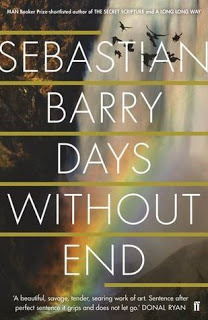
This book nearly killed me it's so beautiful. The unconventional love story of two soldiers who are fighting in the "Indian Wars" and the Civil War is deeply moving and its prose is as lyrical as it is challenging. This book should have been on the shortlist of every major award this year. Not a novel for everyone, but for me, it was truly great. I also highly recommend you listen to this interview with the author that was broadcast on NPR's "Fresh Air" for deeper insights into the book. I've loved other books by Barry but this one is by far his masterpiece.
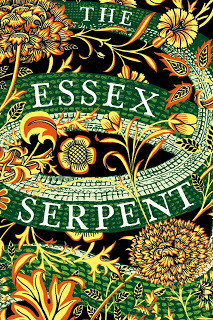
A sensation in England when it was first published, The Essex Serpent hasn't hit American shores with the same fervor but it is just about as perfect as a novel gets. Every sentence is lovely. The descriptive writing, especially of London's gritty, poverty-stricken streets, or the damp, grey eastern coast of England, is phenomenal. And then there are the characters who all become real flesh-and-blood people to the reader. While wholly original, there are also notes of Mary Shelley, Thomas Hardy, and John Fowles in this novel about the way a group of people are impacted by rumors of a terrorizing sea creature in 1800s England. I loved every word of it.
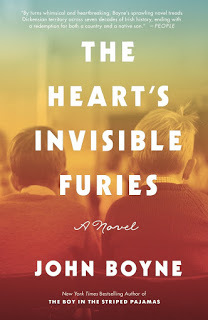
I could not put down this massive tome. It's the history of Ireland from the 1940s until now through the eyes of one man, an orphan who finds love over and over again, only to have it snatched away each time. Beautifully written and realized, with a plot that twists and turns every whichaway, Boyne expects his readers to suspend their disbelief and believe in the inevitability of coincidence, but he is so masterful at it that you do believe in all of it, every single word. This is a terrific, hilarious, sad, and wonderful novel. Grand storytelling at its finest.
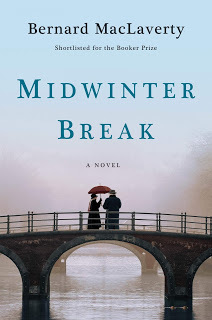
Irish-born and Scottish-resident Bernard MacLaverty is one of my all-time favorite novelists, having written favorites of mine like Grace Notes, Cal, and Lamb. So I was chomping at the bit to read this one and pretty much devoured it in a couple days. As always, it's the smallest observations that MacLaverty manages to capture that makes the worlds he creates so vivid and beautiful. In this novel about an elderly couple who are still together more out of habit than love, MacLaverty explores aging, the need for purpose, and the way we depend on each other. He also evokes Amsterdam so vividly that I feel as if I've been there. I was mesmerized by this novel.
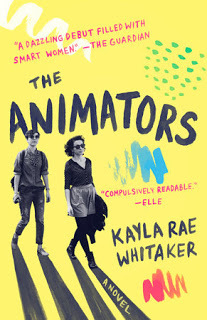
The Animators is a debut novel by Kayla Rae Whitaker that is very timely in that it's about two women artists. It's a hugely American novel but on a more intimate level, it's also the best Appalachian novel of the year by a long-shot. In fact, I think it's one of the best examinations of what it means to be from the region ever, even though it's not technically an Appalachian novel. But there is definitely the element of how people are shaped by the rural, and Appalachian, experience. Whitaker gets that absolutely right, and just about everything else. This is another one that should have had more awards attention. The movie rights were recently sold so I'm hoping it will get an even bigger readership in the near future. It's gritty (some would even say vulgar), hilarious, touching...and you will never forget the two lead characters as you live with them in Brooklyn and Louisville, travel with them to Florida and Eastern Kentucky, and leave the whole thing feeling as if they're old friends you miss after you close the book. Here's a good interview with Whitaker.
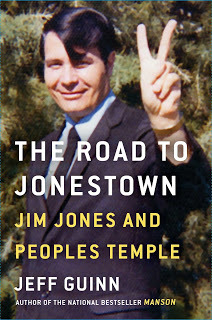
The Jonestown Massacre is something that loomed large in my childhood. I'm not sure why, but perhaps it had something to do with the fact that I was raised in a very religious place where, even as a child, I could understand how people could fall under the spell of a charismatic preacher like Jim Jones. This book gives every detail about Jones and the massacre itself. It's chilling, expertly researched, and very well written. Another lyrical page-turner in my collection of the year's best books.
Here are the other great or really good books I read this year, but none were published this year:
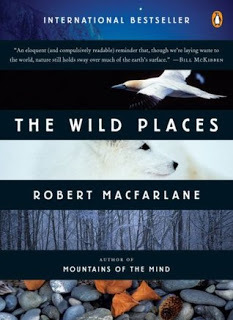
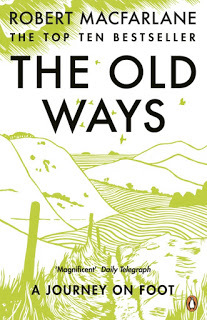 The Wild Places and The Old Ways, both by Robert MacFarlane. I'm obsessed with MacFarlane. He is, bar none, one of our best writers and minds. Read his books and then follow him on Twitter where he shares a Word of the Day each day and offers other lovely insights. Reading his books make me feel better about literature and the world in general. One of my all-time favorite writers and these are two of my favorite books ever.
The Wild Places and The Old Ways, both by Robert MacFarlane. I'm obsessed with MacFarlane. He is, bar none, one of our best writers and minds. Read his books and then follow him on Twitter where he shares a Word of the Day each day and offers other lovely insights. Reading his books make me feel better about literature and the world in general. One of my all-time favorite writers and these are two of my favorite books ever.
Let Us Now Praise Famous Men-James Agee and Walker Evans. I read this book because I was asked to do the keynote at the Agee Conference. It's frustrating, demanding, unconventional, and absolute genius.
Tender-Belinda McKeon. A terrific novel about the thin line between platonic love and sexual obsession. Also a great look at being in college and the way things end up far different than we ever expected. This is a real psychological thriller in the guise of a beautifully written literary novel. Page turner, but a very, very well-written one.
River of Earth-James Still. I re-read this classic every two years and it never, ever gets old. One of the best narrators of all time and one of the most beautiful, simple, and complex stories. If you've never read it, do yourself a favor and read it immediately.
Books I read to prep for teaching in Scotland:
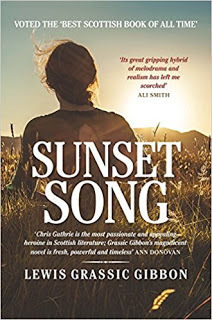
Sunset Song by Lewis Grassic Gibbon is widely considered as Scotland's favorite novel and now that I've read it, I can see why. It's not the easiest of reads as it is full of Scottish dialect but once you get into the rhythm of that, the colloquialisms aren't interruptions so much as they are enriching the experience. The novel is the story of a beautiful and strong Scots woman who faces every obstacle in her desire to find happiness and goodness. It contains two of my favorite lines in all of literature: "You can do without day if you have a lamp quiet-lighted and kind in your heart." That became a mantra for me as I survived the dark days of 2017. The other line is this: "There are lovely things in this world, lovely that do not endure and the lovelier for that." See? That's the kind of swoon-inducing writing contained in this masterpiece. It's also a love-it-or-hate-it film that I happened to love. Here's my favorite scene from the movie.
Grace Notes by Bernard MacLaverty is one of my favorite novels, set in Scotland and Ireland, about the power of music and the desire to please one's family even when we tell ourselves we do not care about that. It is an incredible read. I reread this to teach it in my writing workshop in Scotland.
The Silver Darlings and Highland River, both by Neil Gunn, are among the most beloved novels in Scotland. Dense, lyrical, still very relevant.
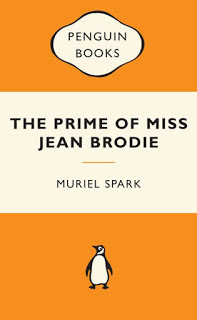
The Prime of Miss Jean Brodie by Muriel Sparks was the common read for our writing class in Scotland and it was a particular relevant novel since at heart it's about how easily people can fall prey to fascism. With that in mind, perhaps everyone should read it RIGHT NOW. It's not a book one leaves with particular love for any of the characters but it is one you'll never forget.
Knots and Crosses-Ian Rankin. Required reading for anyone who is going to Edinburgh. Great mystery.
Commonwealth-Ann Patchett I came late to the party on this novel, having not read it when it was a big sensation. I read it at the lake during our family vacation and could hardly put it down. A truly great novel.
Our Endless Numbered Days-Claire Fuller
The Secret Scripture-Sebastian Barry
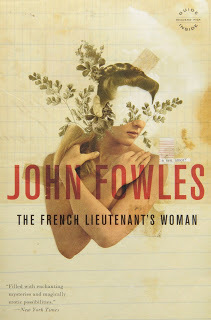
The French Lieutenant’s Woman. John Fowles wrote this novel as a tribute to one of my top two favorite writers, Thomas Hardy, so I've always wanted to read it, and tackled it this year. I loved everything about it. A massive, overwhelming, rich novel.
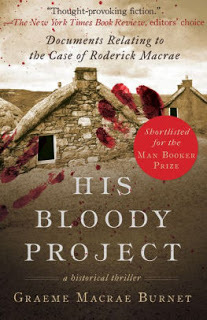
His Bloody Project-Graeme Macrae Burnet. One of the best books I've read in a long time. Frightening, beautifully written, and haunting. I'll never forget it. This book was punished by a very small indie press in Scotland and became a word-of-mouth hit that eventually found its way to becoming a finalist for the prestigious Man-Booker Prize. This book deserved it.
The River-Helen Humphries. I have loved every single thing I've ever read by Humphries, and this hybrid of fiction, poetry, nonfiction, and reportage is one of her best, although my favorite is The Evening Chorus, one of my all-time favorite novels. I also love Coventry by her, too.
Behind the Scenes, Or 30 Years a Slave, Four Years in The White House, by Elizabeth Beckley and
House of Abraham: Lincoln and the Todds, a Family Divided by War, by Stephen Berry. Read as part of my research on a play I'm doing about Mary Todd Lincoln.
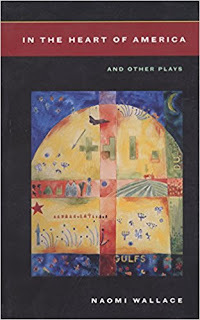
In the Heart of America and Other Plays, by Naomi Wallace. One of my favorite playwrights, especially One Flea Spare, which has been a major influence on the way I think about writing plays.
The Welsh Girl-Peter Ho Davies
My Favorite Books Published in 2017 (no particular order):

This book nearly killed me it's so beautiful. The unconventional love story of two soldiers who are fighting in the "Indian Wars" and the Civil War is deeply moving and its prose is as lyrical as it is challenging. This book should have been on the shortlist of every major award this year. Not a novel for everyone, but for me, it was truly great. I also highly recommend you listen to this interview with the author that was broadcast on NPR's "Fresh Air" for deeper insights into the book. I've loved other books by Barry but this one is by far his masterpiece.

A sensation in England when it was first published, The Essex Serpent hasn't hit American shores with the same fervor but it is just about as perfect as a novel gets. Every sentence is lovely. The descriptive writing, especially of London's gritty, poverty-stricken streets, or the damp, grey eastern coast of England, is phenomenal. And then there are the characters who all become real flesh-and-blood people to the reader. While wholly original, there are also notes of Mary Shelley, Thomas Hardy, and John Fowles in this novel about the way a group of people are impacted by rumors of a terrorizing sea creature in 1800s England. I loved every word of it.

I could not put down this massive tome. It's the history of Ireland from the 1940s until now through the eyes of one man, an orphan who finds love over and over again, only to have it snatched away each time. Beautifully written and realized, with a plot that twists and turns every whichaway, Boyne expects his readers to suspend their disbelief and believe in the inevitability of coincidence, but he is so masterful at it that you do believe in all of it, every single word. This is a terrific, hilarious, sad, and wonderful novel. Grand storytelling at its finest.

Irish-born and Scottish-resident Bernard MacLaverty is one of my all-time favorite novelists, having written favorites of mine like Grace Notes, Cal, and Lamb. So I was chomping at the bit to read this one and pretty much devoured it in a couple days. As always, it's the smallest observations that MacLaverty manages to capture that makes the worlds he creates so vivid and beautiful. In this novel about an elderly couple who are still together more out of habit than love, MacLaverty explores aging, the need for purpose, and the way we depend on each other. He also evokes Amsterdam so vividly that I feel as if I've been there. I was mesmerized by this novel.

The Animators is a debut novel by Kayla Rae Whitaker that is very timely in that it's about two women artists. It's a hugely American novel but on a more intimate level, it's also the best Appalachian novel of the year by a long-shot. In fact, I think it's one of the best examinations of what it means to be from the region ever, even though it's not technically an Appalachian novel. But there is definitely the element of how people are shaped by the rural, and Appalachian, experience. Whitaker gets that absolutely right, and just about everything else. This is another one that should have had more awards attention. The movie rights were recently sold so I'm hoping it will get an even bigger readership in the near future. It's gritty (some would even say vulgar), hilarious, touching...and you will never forget the two lead characters as you live with them in Brooklyn and Louisville, travel with them to Florida and Eastern Kentucky, and leave the whole thing feeling as if they're old friends you miss after you close the book. Here's a good interview with Whitaker.

The Jonestown Massacre is something that loomed large in my childhood. I'm not sure why, but perhaps it had something to do with the fact that I was raised in a very religious place where, even as a child, I could understand how people could fall under the spell of a charismatic preacher like Jim Jones. This book gives every detail about Jones and the massacre itself. It's chilling, expertly researched, and very well written. Another lyrical page-turner in my collection of the year's best books.
Here are the other great or really good books I read this year, but none were published this year:

 The Wild Places and The Old Ways, both by Robert MacFarlane. I'm obsessed with MacFarlane. He is, bar none, one of our best writers and minds. Read his books and then follow him on Twitter where he shares a Word of the Day each day and offers other lovely insights. Reading his books make me feel better about literature and the world in general. One of my all-time favorite writers and these are two of my favorite books ever.
The Wild Places and The Old Ways, both by Robert MacFarlane. I'm obsessed with MacFarlane. He is, bar none, one of our best writers and minds. Read his books and then follow him on Twitter where he shares a Word of the Day each day and offers other lovely insights. Reading his books make me feel better about literature and the world in general. One of my all-time favorite writers and these are two of my favorite books ever.Let Us Now Praise Famous Men-James Agee and Walker Evans. I read this book because I was asked to do the keynote at the Agee Conference. It's frustrating, demanding, unconventional, and absolute genius.
Tender-Belinda McKeon. A terrific novel about the thin line between platonic love and sexual obsession. Also a great look at being in college and the way things end up far different than we ever expected. This is a real psychological thriller in the guise of a beautifully written literary novel. Page turner, but a very, very well-written one.
River of Earth-James Still. I re-read this classic every two years and it never, ever gets old. One of the best narrators of all time and one of the most beautiful, simple, and complex stories. If you've never read it, do yourself a favor and read it immediately.
Books I read to prep for teaching in Scotland:

Sunset Song by Lewis Grassic Gibbon is widely considered as Scotland's favorite novel and now that I've read it, I can see why. It's not the easiest of reads as it is full of Scottish dialect but once you get into the rhythm of that, the colloquialisms aren't interruptions so much as they are enriching the experience. The novel is the story of a beautiful and strong Scots woman who faces every obstacle in her desire to find happiness and goodness. It contains two of my favorite lines in all of literature: "You can do without day if you have a lamp quiet-lighted and kind in your heart." That became a mantra for me as I survived the dark days of 2017. The other line is this: "There are lovely things in this world, lovely that do not endure and the lovelier for that." See? That's the kind of swoon-inducing writing contained in this masterpiece. It's also a love-it-or-hate-it film that I happened to love. Here's my favorite scene from the movie.
Grace Notes by Bernard MacLaverty is one of my favorite novels, set in Scotland and Ireland, about the power of music and the desire to please one's family even when we tell ourselves we do not care about that. It is an incredible read. I reread this to teach it in my writing workshop in Scotland.
The Silver Darlings and Highland River, both by Neil Gunn, are among the most beloved novels in Scotland. Dense, lyrical, still very relevant.

The Prime of Miss Jean Brodie by Muriel Sparks was the common read for our writing class in Scotland and it was a particular relevant novel since at heart it's about how easily people can fall prey to fascism. With that in mind, perhaps everyone should read it RIGHT NOW. It's not a book one leaves with particular love for any of the characters but it is one you'll never forget.
Knots and Crosses-Ian Rankin. Required reading for anyone who is going to Edinburgh. Great mystery.
Commonwealth-Ann Patchett I came late to the party on this novel, having not read it when it was a big sensation. I read it at the lake during our family vacation and could hardly put it down. A truly great novel.
Our Endless Numbered Days-Claire Fuller
The Secret Scripture-Sebastian Barry

The French Lieutenant’s Woman. John Fowles wrote this novel as a tribute to one of my top two favorite writers, Thomas Hardy, so I've always wanted to read it, and tackled it this year. I loved everything about it. A massive, overwhelming, rich novel.

His Bloody Project-Graeme Macrae Burnet. One of the best books I've read in a long time. Frightening, beautifully written, and haunting. I'll never forget it. This book was punished by a very small indie press in Scotland and became a word-of-mouth hit that eventually found its way to becoming a finalist for the prestigious Man-Booker Prize. This book deserved it.
The River-Helen Humphries. I have loved every single thing I've ever read by Humphries, and this hybrid of fiction, poetry, nonfiction, and reportage is one of her best, although my favorite is The Evening Chorus, one of my all-time favorite novels. I also love Coventry by her, too.
Behind the Scenes, Or 30 Years a Slave, Four Years in The White House, by Elizabeth Beckley and
House of Abraham: Lincoln and the Todds, a Family Divided by War, by Stephen Berry. Read as part of my research on a play I'm doing about Mary Todd Lincoln.

In the Heart of America and Other Plays, by Naomi Wallace. One of my favorite playwrights, especially One Flea Spare, which has been a major influence on the way I think about writing plays.
The Welsh Girl-Peter Ho Davies
Published on December 20, 2017 17:01
December 15, 2017
Best Music of 2017
This has been a great year for music. So much, in fact, that it's almost impossible to narrow it down to just a handful of great albums and songs. That's why I've prepared a playlist with 75 songs--more than four and a half hours of music--over on my Spotify account for your listening pleasure. It runs the gamut from country to rock to hip hop to Americana and even some pop that might surprise you (a couple really surprised me, but they're really fine songs), but I've chosen the songs by being honest about what tunes stuck in my head, resonated with me, or moved me, whether that be by bringing a tear to my eye or making me want to dance. They're in no particular order so I suggest putting it on shuffle and just letting the songs play. I hope you'll let me know anything that you discover on there that you end up loving.
But that list is made up of favorite songs and as we all know, albums are very different animals. Albums are like novels. A great album is one you can put on and listen to beginning to end and never get tired of it. I've done the hard task of choosing my favorite albums of the year below and including my reasoning for eleven of them. I hope you find something you love to listen to on the playlist. Here's to 2018 being another great year of music.
My favorite songs of the year--all 75 of them:
And, my favorite albums of the year:
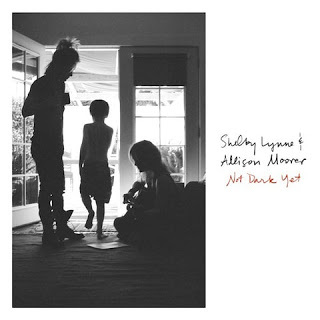 Not Dark Yet by Shelby Lynne and Allison Moorer is exquisite beauty. It's dark and sad, but always full of light and hope, too, much like the title track, written by Bob Dylan. I love the vocals, the arrangements, the production (by one of my all-time favorite singer/songwriter/
Not Dark Yet by Shelby Lynne and Allison Moorer is exquisite beauty. It's dark and sad, but always full of light and hope, too, much like the title track, written by Bob Dylan. I love the vocals, the arrangements, the production (by one of my all-time favorite singer/songwriter/
producers, Teddy Thompson) but I also love it because it perfectly captures the tone of these dark days when we are so often trying to make sense of what's happening to our country and trying to find the light. The songs have been perfectly chosen and these sisters sing together in ways that can tear you down and lift you up all at the same time. I love everything about this record. I also love this short film about the album that was done by Bitter Southerner, so please check it out. And you also will want to see the sisters covering my favorite Tom Petty song, which can't even be ruined by that one asshole who won't stop talking (pardon my language, but there's always that one asshole at a live show who thinks everybody cares about hearing him talk as loudly as possible, isn't there? People who talk at live shows and movies need to be tarred and feathered. Just sayin'.)
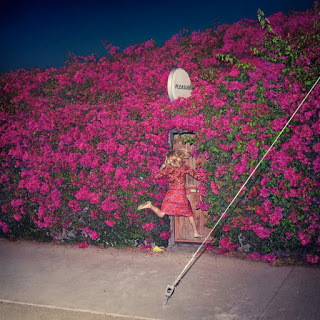 I kind of worship Feist. I have loved every album she has ever made, and this one takes her to new heights. It's not full of singles like her famous "1234" and that's the point. It's an album that needs to be listened to from beginning to end and in doing so you realize that her main goal is in creating something sonic, and something that doesn't sound like anything else out there right now. There is something deeply moving about every word she sings--she gets to the bare heart of emotion with perfectly chosen lines sung with deep mourning and wonder. Put on your earbuds and turn it up as loud as you safely can to hear every layer of songs like the title track, "Any Party", "Century" (most interesting video of the year), or any song on the album. Also, if you ever get a chance to see her live, do it. You'll see a true musical genius on stage who will make everyone in the room feel her deep love for music.
I kind of worship Feist. I have loved every album she has ever made, and this one takes her to new heights. It's not full of singles like her famous "1234" and that's the point. It's an album that needs to be listened to from beginning to end and in doing so you realize that her main goal is in creating something sonic, and something that doesn't sound like anything else out there right now. There is something deeply moving about every word she sings--she gets to the bare heart of emotion with perfectly chosen lines sung with deep mourning and wonder. Put on your earbuds and turn it up as loud as you safely can to hear every layer of songs like the title track, "Any Party", "Century" (most interesting video of the year), or any song on the album. Also, if you ever get a chance to see her live, do it. You'll see a true musical genius on stage who will make everyone in the room feel her deep love for music.
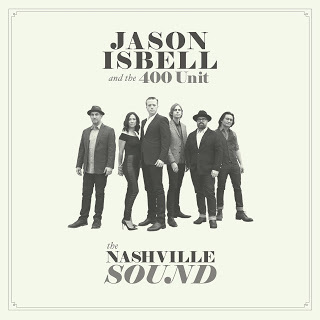 Yes, it's different than Southeastern. Because artists are supposed to evolve and change. So I'm kind of tired of folks who say they don't like this album as much as Isbell's earlier efforts. Isabel isn't trying to be clever in his lyrics, he's trying to tell a story, and again, this is an album that is perfect for this moment. It's about people who are trying to be the best people they can, often making mistakes, but in the process, loving in a big way, working hard, giving their all. There's "Cumberland Gap," which perfectly captures this moment in Appalachia, "Anxiety," which perfectly captures, well, anxiety. There's "If We Were Vampires," which is one of the best love songs I've ever heard. I dare you to listen to it closely and not get a knot in your throat. Song after song, Isbell is at the top of his form here, I think, and I love this whole record.
Yes, it's different than Southeastern. Because artists are supposed to evolve and change. So I'm kind of tired of folks who say they don't like this album as much as Isbell's earlier efforts. Isabel isn't trying to be clever in his lyrics, he's trying to tell a story, and again, this is an album that is perfect for this moment. It's about people who are trying to be the best people they can, often making mistakes, but in the process, loving in a big way, working hard, giving their all. There's "Cumberland Gap," which perfectly captures this moment in Appalachia, "Anxiety," which perfectly captures, well, anxiety. There's "If We Were Vampires," which is one of the best love songs I've ever heard. I dare you to listen to it closely and not get a knot in your throat. Song after song, Isbell is at the top of his form here, I think, and I love this whole record.
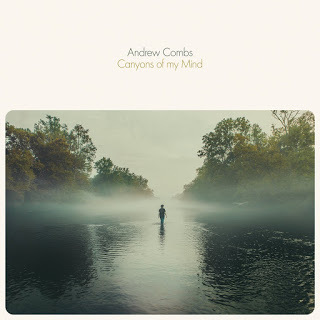 I love to hear Andrew Combs sing. I love the way he puts an album together. I love every track on this. I'd listen to him sing the phone book. And he can flat out write a song, too. This isn't as great as his prior effort, 2015's "All These Dreams", but it's still one of the best albums of the year. Select tracks: "Dirty Rain", "Blood Hunters" (in a "Stranger Things" inspired video). Personal favorite: "Better Way".
I love to hear Andrew Combs sing. I love the way he puts an album together. I love every track on this. I'd listen to him sing the phone book. And he can flat out write a song, too. This isn't as great as his prior effort, 2015's "All These Dreams", but it's still one of the best albums of the year. Select tracks: "Dirty Rain", "Blood Hunters" (in a "Stranger Things" inspired video). Personal favorite: "Better Way".
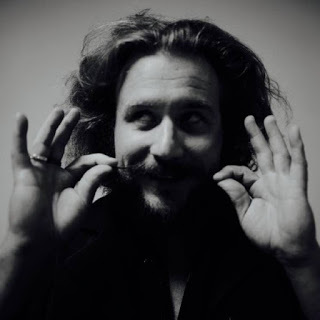 Full disclosure: Jim James is a friend of mine. He's one of the sweetest souls I know. His music is also at the heart of my new novel, Southernmost, which comes out in June. But despite all of that, I would still love this album. All of his sweetness, hope, defiance, and strength comes through on this album of covers made famous by people like Bob Dylan, Willie Nelson, Glenn Campbell, or more obscure gems by under known artists such as Al Bowly, who was once one of Britain's biggest stars but is now widely unknown. On every track Jim James is showcasing his deep love for music. He does it in long piano intros, in winding trills, high howls and warbles, in meditations on the lyrics, drawing the words out so we might recognize their full beauty and power. Continuing the theme of music that speaks to our national moment, this album is no exception. James told this to Billboard recently: "It's a really crazy time in the world right now, a lot of negative energy in the air. A lot of the songs I feel are dealing with that, reflecting on the sadness of that. But also, a part of me likes to remember that life can also be beautiful." Listen to the lead single.
Full disclosure: Jim James is a friend of mine. He's one of the sweetest souls I know. His music is also at the heart of my new novel, Southernmost, which comes out in June. But despite all of that, I would still love this album. All of his sweetness, hope, defiance, and strength comes through on this album of covers made famous by people like Bob Dylan, Willie Nelson, Glenn Campbell, or more obscure gems by under known artists such as Al Bowly, who was once one of Britain's biggest stars but is now widely unknown. On every track Jim James is showcasing his deep love for music. He does it in long piano intros, in winding trills, high howls and warbles, in meditations on the lyrics, drawing the words out so we might recognize their full beauty and power. Continuing the theme of music that speaks to our national moment, this album is no exception. James told this to Billboard recently: "It's a really crazy time in the world right now, a lot of negative energy in the air. A lot of the songs I feel are dealing with that, reflecting on the sadness of that. But also, a part of me likes to remember that life can also be beautiful." Listen to the lead single.
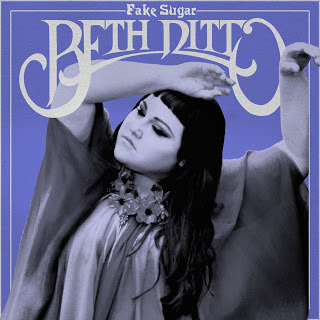 Sometimes you just need a good album to dance around the house to, or to drive to, or to work in the yard to. Well, this energetic, pumping album is good for all of those things, but don't mistake it for just a feel-good dance album. It's also full of thoughtful lyrics that shows Ditto--former lead singer of the now defunct Gossip--letting her Southern flag fly with vocals that showcase her Arkansas twang and fire. Every single song will have you tapping your foot, singing along, and thinking about identity and family. If you can sit still to "Oh La La" I'll give you a dollar. If you can listen to "Clouds (Song for John)" without eventually singing along, I'll give you another one. Not really. But you get my point. You'll also want to check out this NPR article about the record.
Sometimes you just need a good album to dance around the house to, or to drive to, or to work in the yard to. Well, this energetic, pumping album is good for all of those things, but don't mistake it for just a feel-good dance album. It's also full of thoughtful lyrics that shows Ditto--former lead singer of the now defunct Gossip--letting her Southern flag fly with vocals that showcase her Arkansas twang and fire. Every single song will have you tapping your foot, singing along, and thinking about identity and family. If you can sit still to "Oh La La" I'll give you a dollar. If you can listen to "Clouds (Song for John)" without eventually singing along, I'll give you another one. Not really. But you get my point. You'll also want to check out this NPR article about the record.
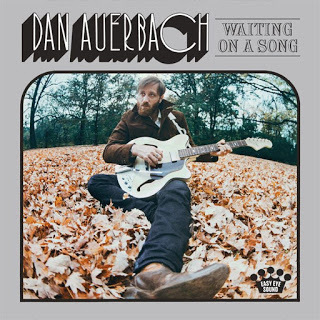 Sometimes it's countryfied-soul, sometimes it's retro-soul, but always, on every song, it works. This album is straight-up enjoyment. Auerbach, half of The Black Keys, wrote the title track for the album with one of his heroes, John Prine, and it's a pretty perfect composition and production. The whole album manages to be a nod to the past while also being completely original and new, never falling victim to becoming derivative. You can find out more about the album and watch several of its videos by going to this link. Favorite tracks: Title song, "Never in My Wildest Dreams", "Malibu Man", "Shine On Me", "Stand By My Girl".
Sometimes it's countryfied-soul, sometimes it's retro-soul, but always, on every song, it works. This album is straight-up enjoyment. Auerbach, half of The Black Keys, wrote the title track for the album with one of his heroes, John Prine, and it's a pretty perfect composition and production. The whole album manages to be a nod to the past while also being completely original and new, never falling victim to becoming derivative. You can find out more about the album and watch several of its videos by going to this link. Favorite tracks: Title song, "Never in My Wildest Dreams", "Malibu Man", "Shine On Me", "Stand By My Girl".
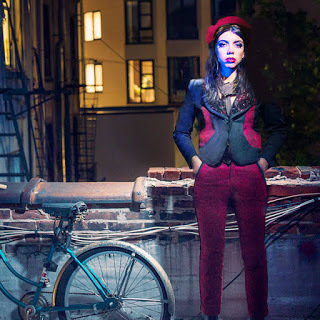 This concept album is a powerhouse, as is this band and it's defiant, strong, outspoken lead singer, Alynda Lee Segarra. It's structured like a Broadway musical, if a Broadway musical ever got written by a working class Puerto Rican girl who grew up in a rough part of New York City. The songs are presented in two acts and are from the point of view of just such a character. Dang, it's good. Give it a listen. Favorite tracks: "Hungry Ghost" , "Living in the City".
This concept album is a powerhouse, as is this band and it's defiant, strong, outspoken lead singer, Alynda Lee Segarra. It's structured like a Broadway musical, if a Broadway musical ever got written by a working class Puerto Rican girl who grew up in a rough part of New York City. The songs are presented in two acts and are from the point of view of just such a character. Dang, it's good. Give it a listen. Favorite tracks: "Hungry Ghost" , "Living in the City".
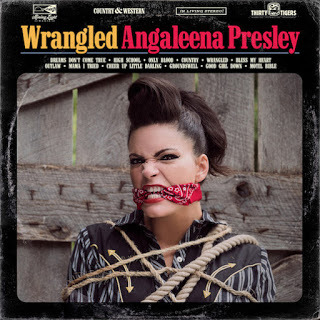 The album cover tells you just about everything you need to know. There she is: beautiful, strong, ready to fight back, bound and gagged. That's the story Angaleena Presley is telling on the country album of the year. The album received no airplay on country radio or awards attention yet it's on dozens of critics' lists for top albums of the year and she's a darling of most anyone who listens to alt-country or Americana. Presley is one of our best songwriters (she wrote one of my all-time favorite songs, "Better Off Red," on her last album) and here she's showcasing some of her best work on songs like "Dreams Don't Come True", "High School", "Only Blood", "Bless My Heart"...well, I could go on but I'd end up naming every song on the album. Give her a listen. Instead of adopting an "if you can't beat them join them", Presley has instead decided that since the country establishment won't accept her she'll just flip them a defiant middle finger (listen to the angry and hilarious song "Country" for proof of that). This coal miner's daughter native of Beauty, Kentucky is a powerhouse. So is this album.
The album cover tells you just about everything you need to know. There she is: beautiful, strong, ready to fight back, bound and gagged. That's the story Angaleena Presley is telling on the country album of the year. The album received no airplay on country radio or awards attention yet it's on dozens of critics' lists for top albums of the year and she's a darling of most anyone who listens to alt-country or Americana. Presley is one of our best songwriters (she wrote one of my all-time favorite songs, "Better Off Red," on her last album) and here she's showcasing some of her best work on songs like "Dreams Don't Come True", "High School", "Only Blood", "Bless My Heart"...well, I could go on but I'd end up naming every song on the album. Give her a listen. Instead of adopting an "if you can't beat them join them", Presley has instead decided that since the country establishment won't accept her she'll just flip them a defiant middle finger (listen to the angry and hilarious song "Country" for proof of that). This coal miner's daughter native of Beauty, Kentucky is a powerhouse. So is this album.
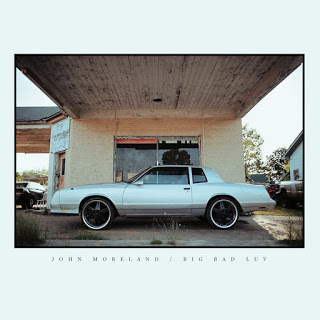 True blues. Great songwriting. Vocals sung from a place of real hurt. There is nothing to not love about this album. Every song is great, but you should especially give a listen to cuts like
True blues. Great songwriting. Vocals sung from a place of real hurt. There is nothing to not love about this album. Every song is great, but you should especially give a listen to cuts like
"It Don't Suit Me (Like Before)" and "Sallisaw Blue".
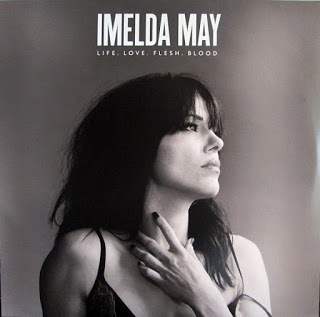 Imelda May is one of my favorite singers, and I love this whole album from beginning to end. This is the most underrated album of the year, without a doubt, and I can't stop listening to it. I love all of the songs on here, but especially "Should've Been Me," which is my favorite song of the year, period, with a deeply moving video. May wrote the song during the demise of a serious relationship while being fed up by legislators who refused to give women's issues the respect they deserve. By the time the song had been recorded it had also become a commentary on the national conversation surrounding the elevation of men who brag about sexual assault yet get voted into the highest offices of power anyway. Watch the video, please, and also give "Call Me" a listen while you're at it.
Imelda May is one of my favorite singers, and I love this whole album from beginning to end. This is the most underrated album of the year, without a doubt, and I can't stop listening to it. I love all of the songs on here, but especially "Should've Been Me," which is my favorite song of the year, period, with a deeply moving video. May wrote the song during the demise of a serious relationship while being fed up by legislators who refused to give women's issues the respect they deserve. By the time the song had been recorded it had also become a commentary on the national conversation surrounding the elevation of men who brag about sexual assault yet get voted into the highest offices of power anyway. Watch the video, please, and also give "Call Me" a listen while you're at it.
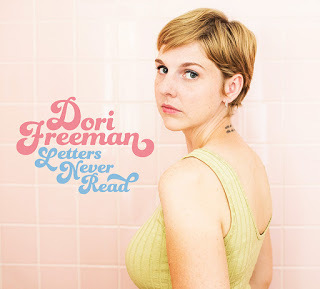 One of the best singer-songwriters out there puts out another gem of an album produced by Teddy Thompson. Standout track: "If I Could Make You My Own" and her exquisite cover of "I Want to See The Bright Lights Tonight."
One of the best singer-songwriters out there puts out another gem of an album produced by Teddy Thompson. Standout track: "If I Could Make You My Own" and her exquisite cover of "I Want to See The Bright Lights Tonight."
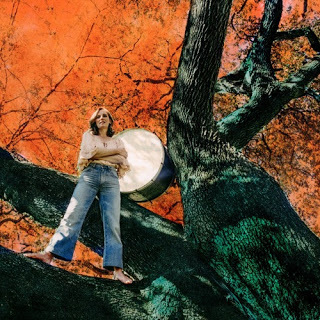 Taft Merritt continues her long streak of lovely work with Stitch of the World, full of equal measures of beauty and grit. I especially love "Dusty Old Man" because it captures everything you need to know about Merritt, especially that husky/sweet/strong/enchanting vocal delivery.
Taft Merritt continues her long streak of lovely work with Stitch of the World, full of equal measures of beauty and grit. I especially love "Dusty Old Man" because it captures everything you need to know about Merritt, especially that husky/sweet/strong/enchanting vocal delivery.
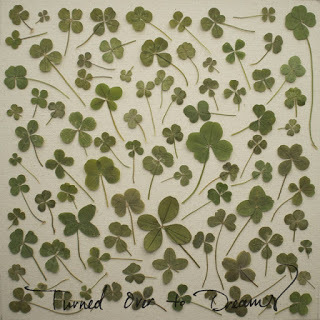 Daniel Martin Moore's Turned Over to Dreams was designed to calm listeners down. This is a risky move for any musician but Martin has never let any challenge get in his way of his art and he proves to be the victor here with a collection of sweet songs that are a welcome respite from the busy and tumultuous lives so many of us find ourselves living. "You Are Home" is about as perfect as a song can get.
Daniel Martin Moore's Turned Over to Dreams was designed to calm listeners down. This is a risky move for any musician but Martin has never let any challenge get in his way of his art and he proves to be the victor here with a collection of sweet songs that are a welcome respite from the busy and tumultuous lives so many of us find ourselves living. "You Are Home" is about as perfect as a song can get.
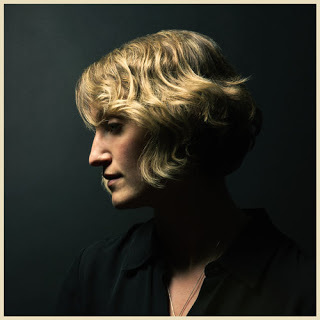 Many lucky folks have long known the power of Joan Shelley's singing and songwriting but this eponymous album, produced by Jeff Tweedy, brings her to a much wider audience. Put this one on with earbuds and listening to her and wonder why she isn't one of the best-known singers out there today. She should be, and if we lived in a world that had better taste, she would be. My favorites: "We'd Be Home" and "Where I'll Find You".
Many lucky folks have long known the power of Joan Shelley's singing and songwriting but this eponymous album, produced by Jeff Tweedy, brings her to a much wider audience. Put this one on with earbuds and listening to her and wonder why she isn't one of the best-known singers out there today. She should be, and if we lived in a world that had better taste, she would be. My favorites: "We'd Be Home" and "Where I'll Find You".
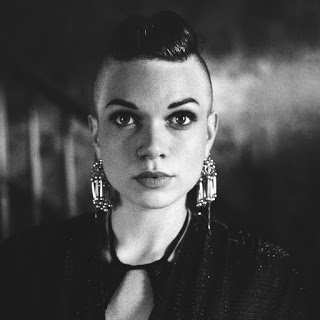 Lillie Mae's Forever And Then Some was produced by Jack White and you can hear it clearly but Mae makes her own sound, as well. I found myself putting this album on again and again, sometimes for my honky-tonk fix, sometimes for that fiddle and those guitar licks, and sometimes to listen for the hundredth time to "Honest and True".
Lillie Mae's Forever And Then Some was produced by Jack White and you can hear it clearly but Mae makes her own sound, as well. I found myself putting this album on again and again, sometimes for my honky-tonk fix, sometimes for that fiddle and those guitar licks, and sometimes to listen for the hundredth time to "Honest and True".
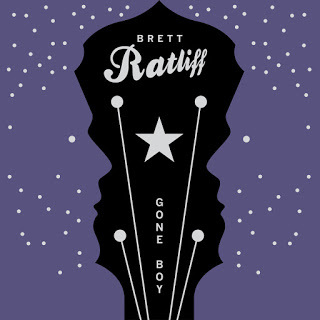 More full disclosure: I wrote the liner notes for this record, and one thing I said in them is this: "Those who understand the culture, those like Ratliff, know that Appalachia is a place thrumming with the eclectic, with the dark and the light. A complex place and people. Many have tried to capture it, but only a handful have succeeded. With Gone Boy, Ratliff becomes one of the few."
More full disclosure: I wrote the liner notes for this record, and one thing I said in them is this: "Those who understand the culture, those like Ratliff, know that Appalachia is a place thrumming with the eclectic, with the dark and the light. A complex place and people. Many have tried to capture it, but only a handful have succeeded. With Gone Boy, Ratliff becomes one of the few."
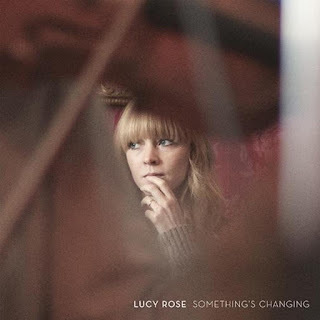 I taught in Scotland three weeks this summer and I heard Lucy Rose constantly: on the radio, in every record store I went into. I found this to be a mesmerizing dream of a record that contains one of my very favorite songs: "Strangest of Ways".
I taught in Scotland three weeks this summer and I heard Lucy Rose constantly: on the radio, in every record store I went into. I found this to be a mesmerizing dream of a record that contains one of my very favorite songs: "Strangest of Ways".
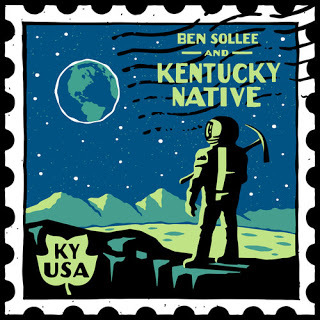 I've long loved Ben Sollee as a person and as a musician. He always keeps pushing the boundaries of his music and that's on fine display here with his album with Kentucky Native. A stand-out track: "Pieces of You".
I've long loved Ben Sollee as a person and as a musician. He always keeps pushing the boundaries of his music and that's on fine display here with his album with Kentucky Native. A stand-out track: "Pieces of You".
Thank you, and happy listening.
But that list is made up of favorite songs and as we all know, albums are very different animals. Albums are like novels. A great album is one you can put on and listen to beginning to end and never get tired of it. I've done the hard task of choosing my favorite albums of the year below and including my reasoning for eleven of them. I hope you find something you love to listen to on the playlist. Here's to 2018 being another great year of music.
My favorite songs of the year--all 75 of them:
And, my favorite albums of the year:
 Not Dark Yet by Shelby Lynne and Allison Moorer is exquisite beauty. It's dark and sad, but always full of light and hope, too, much like the title track, written by Bob Dylan. I love the vocals, the arrangements, the production (by one of my all-time favorite singer/songwriter/
Not Dark Yet by Shelby Lynne and Allison Moorer is exquisite beauty. It's dark and sad, but always full of light and hope, too, much like the title track, written by Bob Dylan. I love the vocals, the arrangements, the production (by one of my all-time favorite singer/songwriter/producers, Teddy Thompson) but I also love it because it perfectly captures the tone of these dark days when we are so often trying to make sense of what's happening to our country and trying to find the light. The songs have been perfectly chosen and these sisters sing together in ways that can tear you down and lift you up all at the same time. I love everything about this record. I also love this short film about the album that was done by Bitter Southerner, so please check it out. And you also will want to see the sisters covering my favorite Tom Petty song, which can't even be ruined by that one asshole who won't stop talking (pardon my language, but there's always that one asshole at a live show who thinks everybody cares about hearing him talk as loudly as possible, isn't there? People who talk at live shows and movies need to be tarred and feathered. Just sayin'.)
 I kind of worship Feist. I have loved every album she has ever made, and this one takes her to new heights. It's not full of singles like her famous "1234" and that's the point. It's an album that needs to be listened to from beginning to end and in doing so you realize that her main goal is in creating something sonic, and something that doesn't sound like anything else out there right now. There is something deeply moving about every word she sings--she gets to the bare heart of emotion with perfectly chosen lines sung with deep mourning and wonder. Put on your earbuds and turn it up as loud as you safely can to hear every layer of songs like the title track, "Any Party", "Century" (most interesting video of the year), or any song on the album. Also, if you ever get a chance to see her live, do it. You'll see a true musical genius on stage who will make everyone in the room feel her deep love for music.
I kind of worship Feist. I have loved every album she has ever made, and this one takes her to new heights. It's not full of singles like her famous "1234" and that's the point. It's an album that needs to be listened to from beginning to end and in doing so you realize that her main goal is in creating something sonic, and something that doesn't sound like anything else out there right now. There is something deeply moving about every word she sings--she gets to the bare heart of emotion with perfectly chosen lines sung with deep mourning and wonder. Put on your earbuds and turn it up as loud as you safely can to hear every layer of songs like the title track, "Any Party", "Century" (most interesting video of the year), or any song on the album. Also, if you ever get a chance to see her live, do it. You'll see a true musical genius on stage who will make everyone in the room feel her deep love for music.  Yes, it's different than Southeastern. Because artists are supposed to evolve and change. So I'm kind of tired of folks who say they don't like this album as much as Isbell's earlier efforts. Isabel isn't trying to be clever in his lyrics, he's trying to tell a story, and again, this is an album that is perfect for this moment. It's about people who are trying to be the best people they can, often making mistakes, but in the process, loving in a big way, working hard, giving their all. There's "Cumberland Gap," which perfectly captures this moment in Appalachia, "Anxiety," which perfectly captures, well, anxiety. There's "If We Were Vampires," which is one of the best love songs I've ever heard. I dare you to listen to it closely and not get a knot in your throat. Song after song, Isbell is at the top of his form here, I think, and I love this whole record.
Yes, it's different than Southeastern. Because artists are supposed to evolve and change. So I'm kind of tired of folks who say they don't like this album as much as Isbell's earlier efforts. Isabel isn't trying to be clever in his lyrics, he's trying to tell a story, and again, this is an album that is perfect for this moment. It's about people who are trying to be the best people they can, often making mistakes, but in the process, loving in a big way, working hard, giving their all. There's "Cumberland Gap," which perfectly captures this moment in Appalachia, "Anxiety," which perfectly captures, well, anxiety. There's "If We Were Vampires," which is one of the best love songs I've ever heard. I dare you to listen to it closely and not get a knot in your throat. Song after song, Isbell is at the top of his form here, I think, and I love this whole record. I love to hear Andrew Combs sing. I love the way he puts an album together. I love every track on this. I'd listen to him sing the phone book. And he can flat out write a song, too. This isn't as great as his prior effort, 2015's "All These Dreams", but it's still one of the best albums of the year. Select tracks: "Dirty Rain", "Blood Hunters" (in a "Stranger Things" inspired video). Personal favorite: "Better Way".
I love to hear Andrew Combs sing. I love the way he puts an album together. I love every track on this. I'd listen to him sing the phone book. And he can flat out write a song, too. This isn't as great as his prior effort, 2015's "All These Dreams", but it's still one of the best albums of the year. Select tracks: "Dirty Rain", "Blood Hunters" (in a "Stranger Things" inspired video). Personal favorite: "Better Way". Full disclosure: Jim James is a friend of mine. He's one of the sweetest souls I know. His music is also at the heart of my new novel, Southernmost, which comes out in June. But despite all of that, I would still love this album. All of his sweetness, hope, defiance, and strength comes through on this album of covers made famous by people like Bob Dylan, Willie Nelson, Glenn Campbell, or more obscure gems by under known artists such as Al Bowly, who was once one of Britain's biggest stars but is now widely unknown. On every track Jim James is showcasing his deep love for music. He does it in long piano intros, in winding trills, high howls and warbles, in meditations on the lyrics, drawing the words out so we might recognize their full beauty and power. Continuing the theme of music that speaks to our national moment, this album is no exception. James told this to Billboard recently: "It's a really crazy time in the world right now, a lot of negative energy in the air. A lot of the songs I feel are dealing with that, reflecting on the sadness of that. But also, a part of me likes to remember that life can also be beautiful." Listen to the lead single.
Full disclosure: Jim James is a friend of mine. He's one of the sweetest souls I know. His music is also at the heart of my new novel, Southernmost, which comes out in June. But despite all of that, I would still love this album. All of his sweetness, hope, defiance, and strength comes through on this album of covers made famous by people like Bob Dylan, Willie Nelson, Glenn Campbell, or more obscure gems by under known artists such as Al Bowly, who was once one of Britain's biggest stars but is now widely unknown. On every track Jim James is showcasing his deep love for music. He does it in long piano intros, in winding trills, high howls and warbles, in meditations on the lyrics, drawing the words out so we might recognize their full beauty and power. Continuing the theme of music that speaks to our national moment, this album is no exception. James told this to Billboard recently: "It's a really crazy time in the world right now, a lot of negative energy in the air. A lot of the songs I feel are dealing with that, reflecting on the sadness of that. But also, a part of me likes to remember that life can also be beautiful." Listen to the lead single.  Sometimes you just need a good album to dance around the house to, or to drive to, or to work in the yard to. Well, this energetic, pumping album is good for all of those things, but don't mistake it for just a feel-good dance album. It's also full of thoughtful lyrics that shows Ditto--former lead singer of the now defunct Gossip--letting her Southern flag fly with vocals that showcase her Arkansas twang and fire. Every single song will have you tapping your foot, singing along, and thinking about identity and family. If you can sit still to "Oh La La" I'll give you a dollar. If you can listen to "Clouds (Song for John)" without eventually singing along, I'll give you another one. Not really. But you get my point. You'll also want to check out this NPR article about the record.
Sometimes you just need a good album to dance around the house to, or to drive to, or to work in the yard to. Well, this energetic, pumping album is good for all of those things, but don't mistake it for just a feel-good dance album. It's also full of thoughtful lyrics that shows Ditto--former lead singer of the now defunct Gossip--letting her Southern flag fly with vocals that showcase her Arkansas twang and fire. Every single song will have you tapping your foot, singing along, and thinking about identity and family. If you can sit still to "Oh La La" I'll give you a dollar. If you can listen to "Clouds (Song for John)" without eventually singing along, I'll give you another one. Not really. But you get my point. You'll also want to check out this NPR article about the record.  Sometimes it's countryfied-soul, sometimes it's retro-soul, but always, on every song, it works. This album is straight-up enjoyment. Auerbach, half of The Black Keys, wrote the title track for the album with one of his heroes, John Prine, and it's a pretty perfect composition and production. The whole album manages to be a nod to the past while also being completely original and new, never falling victim to becoming derivative. You can find out more about the album and watch several of its videos by going to this link. Favorite tracks: Title song, "Never in My Wildest Dreams", "Malibu Man", "Shine On Me", "Stand By My Girl".
Sometimes it's countryfied-soul, sometimes it's retro-soul, but always, on every song, it works. This album is straight-up enjoyment. Auerbach, half of The Black Keys, wrote the title track for the album with one of his heroes, John Prine, and it's a pretty perfect composition and production. The whole album manages to be a nod to the past while also being completely original and new, never falling victim to becoming derivative. You can find out more about the album and watch several of its videos by going to this link. Favorite tracks: Title song, "Never in My Wildest Dreams", "Malibu Man", "Shine On Me", "Stand By My Girl". This concept album is a powerhouse, as is this band and it's defiant, strong, outspoken lead singer, Alynda Lee Segarra. It's structured like a Broadway musical, if a Broadway musical ever got written by a working class Puerto Rican girl who grew up in a rough part of New York City. The songs are presented in two acts and are from the point of view of just such a character. Dang, it's good. Give it a listen. Favorite tracks: "Hungry Ghost" , "Living in the City".
This concept album is a powerhouse, as is this band and it's defiant, strong, outspoken lead singer, Alynda Lee Segarra. It's structured like a Broadway musical, if a Broadway musical ever got written by a working class Puerto Rican girl who grew up in a rough part of New York City. The songs are presented in two acts and are from the point of view of just such a character. Dang, it's good. Give it a listen. Favorite tracks: "Hungry Ghost" , "Living in the City". The album cover tells you just about everything you need to know. There she is: beautiful, strong, ready to fight back, bound and gagged. That's the story Angaleena Presley is telling on the country album of the year. The album received no airplay on country radio or awards attention yet it's on dozens of critics' lists for top albums of the year and she's a darling of most anyone who listens to alt-country or Americana. Presley is one of our best songwriters (she wrote one of my all-time favorite songs, "Better Off Red," on her last album) and here she's showcasing some of her best work on songs like "Dreams Don't Come True", "High School", "Only Blood", "Bless My Heart"...well, I could go on but I'd end up naming every song on the album. Give her a listen. Instead of adopting an "if you can't beat them join them", Presley has instead decided that since the country establishment won't accept her she'll just flip them a defiant middle finger (listen to the angry and hilarious song "Country" for proof of that). This coal miner's daughter native of Beauty, Kentucky is a powerhouse. So is this album.
The album cover tells you just about everything you need to know. There she is: beautiful, strong, ready to fight back, bound and gagged. That's the story Angaleena Presley is telling on the country album of the year. The album received no airplay on country radio or awards attention yet it's on dozens of critics' lists for top albums of the year and she's a darling of most anyone who listens to alt-country or Americana. Presley is one of our best songwriters (she wrote one of my all-time favorite songs, "Better Off Red," on her last album) and here she's showcasing some of her best work on songs like "Dreams Don't Come True", "High School", "Only Blood", "Bless My Heart"...well, I could go on but I'd end up naming every song on the album. Give her a listen. Instead of adopting an "if you can't beat them join them", Presley has instead decided that since the country establishment won't accept her she'll just flip them a defiant middle finger (listen to the angry and hilarious song "Country" for proof of that). This coal miner's daughter native of Beauty, Kentucky is a powerhouse. So is this album.  True blues. Great songwriting. Vocals sung from a place of real hurt. There is nothing to not love about this album. Every song is great, but you should especially give a listen to cuts like
True blues. Great songwriting. Vocals sung from a place of real hurt. There is nothing to not love about this album. Every song is great, but you should especially give a listen to cuts like"It Don't Suit Me (Like Before)" and "Sallisaw Blue".
 Imelda May is one of my favorite singers, and I love this whole album from beginning to end. This is the most underrated album of the year, without a doubt, and I can't stop listening to it. I love all of the songs on here, but especially "Should've Been Me," which is my favorite song of the year, period, with a deeply moving video. May wrote the song during the demise of a serious relationship while being fed up by legislators who refused to give women's issues the respect they deserve. By the time the song had been recorded it had also become a commentary on the national conversation surrounding the elevation of men who brag about sexual assault yet get voted into the highest offices of power anyway. Watch the video, please, and also give "Call Me" a listen while you're at it.
Imelda May is one of my favorite singers, and I love this whole album from beginning to end. This is the most underrated album of the year, without a doubt, and I can't stop listening to it. I love all of the songs on here, but especially "Should've Been Me," which is my favorite song of the year, period, with a deeply moving video. May wrote the song during the demise of a serious relationship while being fed up by legislators who refused to give women's issues the respect they deserve. By the time the song had been recorded it had also become a commentary on the national conversation surrounding the elevation of men who brag about sexual assault yet get voted into the highest offices of power anyway. Watch the video, please, and also give "Call Me" a listen while you're at it. One of the best singer-songwriters out there puts out another gem of an album produced by Teddy Thompson. Standout track: "If I Could Make You My Own" and her exquisite cover of "I Want to See The Bright Lights Tonight."
One of the best singer-songwriters out there puts out another gem of an album produced by Teddy Thompson. Standout track: "If I Could Make You My Own" and her exquisite cover of "I Want to See The Bright Lights Tonight."
 Taft Merritt continues her long streak of lovely work with Stitch of the World, full of equal measures of beauty and grit. I especially love "Dusty Old Man" because it captures everything you need to know about Merritt, especially that husky/sweet/strong/enchanting vocal delivery.
Taft Merritt continues her long streak of lovely work with Stitch of the World, full of equal measures of beauty and grit. I especially love "Dusty Old Man" because it captures everything you need to know about Merritt, especially that husky/sweet/strong/enchanting vocal delivery.
 Daniel Martin Moore's Turned Over to Dreams was designed to calm listeners down. This is a risky move for any musician but Martin has never let any challenge get in his way of his art and he proves to be the victor here with a collection of sweet songs that are a welcome respite from the busy and tumultuous lives so many of us find ourselves living. "You Are Home" is about as perfect as a song can get.
Daniel Martin Moore's Turned Over to Dreams was designed to calm listeners down. This is a risky move for any musician but Martin has never let any challenge get in his way of his art and he proves to be the victor here with a collection of sweet songs that are a welcome respite from the busy and tumultuous lives so many of us find ourselves living. "You Are Home" is about as perfect as a song can get.
 Many lucky folks have long known the power of Joan Shelley's singing and songwriting but this eponymous album, produced by Jeff Tweedy, brings her to a much wider audience. Put this one on with earbuds and listening to her and wonder why she isn't one of the best-known singers out there today. She should be, and if we lived in a world that had better taste, she would be. My favorites: "We'd Be Home" and "Where I'll Find You".
Many lucky folks have long known the power of Joan Shelley's singing and songwriting but this eponymous album, produced by Jeff Tweedy, brings her to a much wider audience. Put this one on with earbuds and listening to her and wonder why she isn't one of the best-known singers out there today. She should be, and if we lived in a world that had better taste, she would be. My favorites: "We'd Be Home" and "Where I'll Find You".
 Lillie Mae's Forever And Then Some was produced by Jack White and you can hear it clearly but Mae makes her own sound, as well. I found myself putting this album on again and again, sometimes for my honky-tonk fix, sometimes for that fiddle and those guitar licks, and sometimes to listen for the hundredth time to "Honest and True".
Lillie Mae's Forever And Then Some was produced by Jack White and you can hear it clearly but Mae makes her own sound, as well. I found myself putting this album on again and again, sometimes for my honky-tonk fix, sometimes for that fiddle and those guitar licks, and sometimes to listen for the hundredth time to "Honest and True".  More full disclosure: I wrote the liner notes for this record, and one thing I said in them is this: "Those who understand the culture, those like Ratliff, know that Appalachia is a place thrumming with the eclectic, with the dark and the light. A complex place and people. Many have tried to capture it, but only a handful have succeeded. With Gone Boy, Ratliff becomes one of the few."
More full disclosure: I wrote the liner notes for this record, and one thing I said in them is this: "Those who understand the culture, those like Ratliff, know that Appalachia is a place thrumming with the eclectic, with the dark and the light. A complex place and people. Many have tried to capture it, but only a handful have succeeded. With Gone Boy, Ratliff becomes one of the few."  I taught in Scotland three weeks this summer and I heard Lucy Rose constantly: on the radio, in every record store I went into. I found this to be a mesmerizing dream of a record that contains one of my very favorite songs: "Strangest of Ways".
I taught in Scotland three weeks this summer and I heard Lucy Rose constantly: on the radio, in every record store I went into. I found this to be a mesmerizing dream of a record that contains one of my very favorite songs: "Strangest of Ways".  I've long loved Ben Sollee as a person and as a musician. He always keeps pushing the boundaries of his music and that's on fine display here with his album with Kentucky Native. A stand-out track: "Pieces of You".
I've long loved Ben Sollee as a person and as a musician. He always keeps pushing the boundaries of his music and that's on fine display here with his album with Kentucky Native. A stand-out track: "Pieces of You". Thank you, and happy listening.
Published on December 15, 2017 11:19
August 30, 2017
The Flood, Then and Now
The March I was a year old, it rained for two weeks in the South. My mother tells me that she could never get my diapers dry because she couldn't hang them out on the clothesline (we didn't have a dryer, of course) and even when she hung them all over the house, our tiny little trailer was too damp for them to dry.
"Everything we had in the world was in that little trailer," my mother told me last night. At the time of the flood my father had been back from Vietnam about five years and worked as a mechanic in a local gas station. My mother was a part-time assembler at the refrigerator factory in the next town over. They worked all the time. I have very few memories of them being still.
Our trailer sat snugly between the rise of the L&N railroad track and the normally placid waters of the Little Laurel River, which was now becoming swollen and violent. In other words, there was no chance we'd make it through fourteen days of continuous rain. They watched as the water crept across the yard, easing to the edges of our home, and rose all the way to their front door. "And then one morning, it rained so hard it looked like it was raining backwards," my mother tells me now. "We knew that we had to get out." By the time they got together a few things--most importantly she plucked up my baby book and a framed photograph of their wedding day--the water was up to the windows of our trailer. Their truck couldn't make it out as the water was already too high.
My mother waded through the waist-deep water with me on her hip. At some point I dropped the stuffed animal I was clutching into the floodwaters. Nobody remembers if he was a teddy bear, a dog, or what kind of creature, but we all recall that he was called Harry. I must have been so frozen I couldn't even call out because my mother didn't realize I had lost him until she made it to dry land.
That afternoon my parents, aunts, uncles, and some neighbors took johnboats to salvage as much as they could from our trailer there between the railroad tracks and the Little Laurel River. Just about everything was ruined. We lived for two weeks with my granny in her four room house down the road, situated on a ridge above the flood. When the water receded enough my parents went back to see what could be salvaged. They had to completely replace the floors and spent many days scrubbing the mud and muck from the walls but they couldn't afford a new house and eventually we moved back in. My parents had been married five years and my mother says that is the first time she saw my father shed tears.
I don't remember any of this. I had heard bits of pieces of this story but hadn't heard it all until yesterday, when the disastrous floods in Texas caused my mother to talk about it at length. I had always thought that I had escaped in one of the boats, not on my mother's hip as she waded through the waters. I had always imagined Harry falling from my arms and being swept away in the flood and no one being able to reach him from our perch in the boat.
Now I know that across the state from us, the Mississippi hit its highest flood stage in two centuries. Now I know that 26 people died in the floods that spring. I suppose it is a blessing that I don't remember because today I grieve for that young mother who had to leave nearly everything behind, not knowing if she'd see any of it again. I grieve for my father, staying behind to fight it as long as he could. I think of how hard they both worked, how they had to start over from scratch, how discouraged and tired they must have been in those days and weeks afterward. But my mother says that the obstacle just made them stronger. The flood gave them even more determination to keep working hard, to keep going forward.
Always when it was mentioned to me as a child there was the sentiment that it had been expected that things like this happened first and worst to the poorest folks. And that it was not expected that anyone would help us except ourselves. Our expectations were that our neighbors, friends, and family would be there for us no matter what. Our expectation was that my people had always done for themselves and would keep right on doing that.Seems like things haven't changed too much in all these years since. I'm thinking of all the people in Texas impacted by these disastrous floods and of all those who are helping them. And I'm especially thinking of those who aren't helping because it's their job, or because they've been ordered to, but because they know it's the right thing to do.

"Everything we had in the world was in that little trailer," my mother told me last night. At the time of the flood my father had been back from Vietnam about five years and worked as a mechanic in a local gas station. My mother was a part-time assembler at the refrigerator factory in the next town over. They worked all the time. I have very few memories of them being still.
Our trailer sat snugly between the rise of the L&N railroad track and the normally placid waters of the Little Laurel River, which was now becoming swollen and violent. In other words, there was no chance we'd make it through fourteen days of continuous rain. They watched as the water crept across the yard, easing to the edges of our home, and rose all the way to their front door. "And then one morning, it rained so hard it looked like it was raining backwards," my mother tells me now. "We knew that we had to get out." By the time they got together a few things--most importantly she plucked up my baby book and a framed photograph of their wedding day--the water was up to the windows of our trailer. Their truck couldn't make it out as the water was already too high.
My mother waded through the waist-deep water with me on her hip. At some point I dropped the stuffed animal I was clutching into the floodwaters. Nobody remembers if he was a teddy bear, a dog, or what kind of creature, but we all recall that he was called Harry. I must have been so frozen I couldn't even call out because my mother didn't realize I had lost him until she made it to dry land.
That afternoon my parents, aunts, uncles, and some neighbors took johnboats to salvage as much as they could from our trailer there between the railroad tracks and the Little Laurel River. Just about everything was ruined. We lived for two weeks with my granny in her four room house down the road, situated on a ridge above the flood. When the water receded enough my parents went back to see what could be salvaged. They had to completely replace the floors and spent many days scrubbing the mud and muck from the walls but they couldn't afford a new house and eventually we moved back in. My parents had been married five years and my mother says that is the first time she saw my father shed tears.
I don't remember any of this. I had heard bits of pieces of this story but hadn't heard it all until yesterday, when the disastrous floods in Texas caused my mother to talk about it at length. I had always thought that I had escaped in one of the boats, not on my mother's hip as she waded through the waters. I had always imagined Harry falling from my arms and being swept away in the flood and no one being able to reach him from our perch in the boat.
Now I know that across the state from us, the Mississippi hit its highest flood stage in two centuries. Now I know that 26 people died in the floods that spring. I suppose it is a blessing that I don't remember because today I grieve for that young mother who had to leave nearly everything behind, not knowing if she'd see any of it again. I grieve for my father, staying behind to fight it as long as he could. I think of how hard they both worked, how they had to start over from scratch, how discouraged and tired they must have been in those days and weeks afterward. But my mother says that the obstacle just made them stronger. The flood gave them even more determination to keep working hard, to keep going forward.
Always when it was mentioned to me as a child there was the sentiment that it had been expected that things like this happened first and worst to the poorest folks. And that it was not expected that anyone would help us except ourselves. Our expectations were that our neighbors, friends, and family would be there for us no matter what. Our expectation was that my people had always done for themselves and would keep right on doing that.Seems like things haven't changed too much in all these years since. I'm thinking of all the people in Texas impacted by these disastrous floods and of all those who are helping them. And I'm especially thinking of those who aren't helping because it's their job, or because they've been ordered to, but because they know it's the right thing to do.

Published on August 30, 2017 14:35
June 28, 2017
Songs of Summer 2017
When I think of summer songs, I think of songs that would be good for a day out on the lake, or a long bike ride, or while enjoying my own back yard. Songs of summer tend to be more upbeat, lighter fare. So the larger culture's "Songs of Summer" tend to be more on the mindless, pop side...not that there's anything wrong with that. But I like something I can tap my foot to that also has a lot going on between the lines of the song and in the production as well. I couldn't resist throwing in a couple of ballads that I'm loving right now. I wanted to pick songs that have only come out recently, too. So below are the videos of my picks for this year's Songs of Summer, in no particular order. Or you can just go straight to my Spotify and listen to them there.
Shine On Me-Dan Auerbach
Should've Been You-Imelda May
Better Way-Andrew Combs
Pleasure-Feist
Over-Kings of Leon
Electric Love-Serena Ryder
Green Eyes-Aubrie Sellers
Hungry Ghost-Hurray for the Riff Raff
Cumberland Gap-Jason Isbell
Honest and True-Lillie Mae
The Story-Dolly Parton
The Glory of Love-Parker Millsap and Sarah Jarosz
Second One to Know-Chris Stapelton
Unsettled-Justin Rutledge
Shine On Me-Dan Auerbach
Should've Been You-Imelda May
Better Way-Andrew Combs
Pleasure-Feist
Over-Kings of Leon
Electric Love-Serena Ryder
Green Eyes-Aubrie Sellers
Hungry Ghost-Hurray for the Riff Raff
Cumberland Gap-Jason Isbell
Honest and True-Lillie Mae
The Story-Dolly Parton
The Glory of Love-Parker Millsap and Sarah Jarosz
Second One to Know-Chris Stapelton
Unsettled-Justin Rutledge
Published on June 28, 2017 07:48
January 28, 2017
Evening in America: 31 Years After the Challenger Explosion
January 28, 1986. We were out of school that day for snow. My best friend, Donna, and I were riding sleds off the strip mine across the road from my house. My mother came out onto the porch and hollered, telling us to come in "right now". She didn't say why but her words telegraphed over the frozen air to us that something bad had happened.
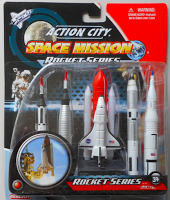 I had not wanted to miss school that day because we were scheduled to watch the launch. There had been a special station set up for schools to watch via NASA and it was always exciting when the massive television was wheeled into our classroom on its metal stand. This was a time when children were very interested in the space program and the space shuttles had made us even more interested. There were action figures and model kits and toys dedicated to the space missions. We learned all about the astronauts in class. We were the children of the Cold War, still three years from the fall of the Berlin Wall, and there was national pride in the space race. Like many children, I worried a lot about the Russians and how they might drop the bomb on us someday with no notice. Somehow the space program assuaged those fears with Regan's "Star Wars" initiative to ward off nuclear missiles and such.
I had not wanted to miss school that day because we were scheduled to watch the launch. There had been a special station set up for schools to watch via NASA and it was always exciting when the massive television was wheeled into our classroom on its metal stand. This was a time when children were very interested in the space program and the space shuttles had made us even more interested. There were action figures and model kits and toys dedicated to the space missions. We learned all about the astronauts in class. We were the children of the Cold War, still three years from the fall of the Berlin Wall, and there was national pride in the space race. Like many children, I worried a lot about the Russians and how they might drop the bomb on us someday with no notice. Somehow the space program assuaged those fears with Regan's "Star Wars" initiative to ward off nuclear missiles and such.
Inside, my mother had built a roaring fire in the fireplace. She had a talent for making fires. The heat surrounded us and I knew something was really wrong because my mother wasn't at our heels to make sure we didn't get mud and snow on the carpet. Instead she insisted we come on in without even taking off our shoes. She wasn't crying but her face was shaped by a new grief. She worked in the lunchroom at school, so she had been enjoying the snow day, too. She was still in her nightgown and housecoat and house shoes even though it was almost noon. My mother hardly ever arose without instantly dressing. From the living room I could hear Dan Rather, whom my father still didn't like because he wasn't Walter Cronkite. And then I knew it was something beyond our own lives. "That teacher," my mother said. "All of them." We watched the news a long while, the only time I remember being parked in front of the news like that. They replayed the explosion, the reactions of the crowd, the stories of each of the astronauts, especially Christa McAuliffe. We had been watching her especially close because she was a school teacher, a civilian who was going into space. In the weeks leading up to the launch we had been well-versed in her story through our study of The Weekly Reader, a favorite part of school for any member of Generation X. It was Morning in America and we were proud of it.
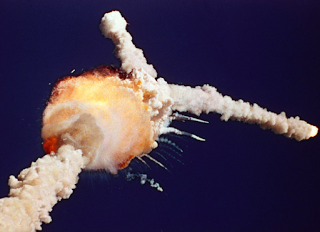 My father, who worked third shift at the local fiberglass factory (which would explode seventeen years later, killing seven people), got up earlier than usual and watched, too, in silence. We sat there far into the evening, until President Reagan came on and gave his speech. He was supposed to give The State of the Union address that night but instead spoke to the country that was united in grief. Despite what anyone might think of Reagan now, there's no denying the real emotion he felt that night, and his beautifully delivered words were a balm (written by Peggy Noonan, using parts of a poem from John Magee): "We will never forget them, nor the last time we saw them, this morning, as they prepared for their journey and waved goodbye and 'slipped the surly bonds of Earth' to 'touch the face of God.'"
My father, who worked third shift at the local fiberglass factory (which would explode seventeen years later, killing seven people), got up earlier than usual and watched, too, in silence. We sat there far into the evening, until President Reagan came on and gave his speech. He was supposed to give The State of the Union address that night but instead spoke to the country that was united in grief. Despite what anyone might think of Reagan now, there's no denying the real emotion he felt that night, and his beautifully delivered words were a balm (written by Peggy Noonan, using parts of a poem from John Magee): "We will never forget them, nor the last time we saw them, this morning, as they prepared for their journey and waved goodbye and 'slipped the surly bonds of Earth' to 'touch the face of God.'"
I asked if I could go for a walk. By this time it was full dark and the whole world seemed stilled and frozen. There was no sound except the distant and insistent barking of a dog. Our road was completely covered in an inch of ice, then several inches of snow. All the houses held windows glowing an eerie blue from the televisions inside. I looked up at the sky, pocked by hundreds of stars. I was thirteen years old but in my memory I felt much younger. I recall it as the first time I ever felt part of a national tragedy, a story the whole world was watching. Back then I thought that was the worst thing that could ever happen to us as a country. I've thought back on it during other dark days in our history since, obviously on September 11, but on other days when we didn't feel as united in our griefs. For my generation, it's the first moment we can all look back on and tell you where we were when it happened, the way my parents's generation can tell you where they were when Kennedy was assassinated, or the way my daughters' generation already speak with nostalgia about 9/11. For me, it's also one of the first times I realized the power of language, the impact that words can have.
 I had not wanted to miss school that day because we were scheduled to watch the launch. There had been a special station set up for schools to watch via NASA and it was always exciting when the massive television was wheeled into our classroom on its metal stand. This was a time when children were very interested in the space program and the space shuttles had made us even more interested. There were action figures and model kits and toys dedicated to the space missions. We learned all about the astronauts in class. We were the children of the Cold War, still three years from the fall of the Berlin Wall, and there was national pride in the space race. Like many children, I worried a lot about the Russians and how they might drop the bomb on us someday with no notice. Somehow the space program assuaged those fears with Regan's "Star Wars" initiative to ward off nuclear missiles and such.
I had not wanted to miss school that day because we were scheduled to watch the launch. There had been a special station set up for schools to watch via NASA and it was always exciting when the massive television was wheeled into our classroom on its metal stand. This was a time when children were very interested in the space program and the space shuttles had made us even more interested. There were action figures and model kits and toys dedicated to the space missions. We learned all about the astronauts in class. We were the children of the Cold War, still three years from the fall of the Berlin Wall, and there was national pride in the space race. Like many children, I worried a lot about the Russians and how they might drop the bomb on us someday with no notice. Somehow the space program assuaged those fears with Regan's "Star Wars" initiative to ward off nuclear missiles and such.Inside, my mother had built a roaring fire in the fireplace. She had a talent for making fires. The heat surrounded us and I knew something was really wrong because my mother wasn't at our heels to make sure we didn't get mud and snow on the carpet. Instead she insisted we come on in without even taking off our shoes. She wasn't crying but her face was shaped by a new grief. She worked in the lunchroom at school, so she had been enjoying the snow day, too. She was still in her nightgown and housecoat and house shoes even though it was almost noon. My mother hardly ever arose without instantly dressing. From the living room I could hear Dan Rather, whom my father still didn't like because he wasn't Walter Cronkite. And then I knew it was something beyond our own lives. "That teacher," my mother said. "All of them." We watched the news a long while, the only time I remember being parked in front of the news like that. They replayed the explosion, the reactions of the crowd, the stories of each of the astronauts, especially Christa McAuliffe. We had been watching her especially close because she was a school teacher, a civilian who was going into space. In the weeks leading up to the launch we had been well-versed in her story through our study of The Weekly Reader, a favorite part of school for any member of Generation X. It was Morning in America and we were proud of it.
 My father, who worked third shift at the local fiberglass factory (which would explode seventeen years later, killing seven people), got up earlier than usual and watched, too, in silence. We sat there far into the evening, until President Reagan came on and gave his speech. He was supposed to give The State of the Union address that night but instead spoke to the country that was united in grief. Despite what anyone might think of Reagan now, there's no denying the real emotion he felt that night, and his beautifully delivered words were a balm (written by Peggy Noonan, using parts of a poem from John Magee): "We will never forget them, nor the last time we saw them, this morning, as they prepared for their journey and waved goodbye and 'slipped the surly bonds of Earth' to 'touch the face of God.'"
My father, who worked third shift at the local fiberglass factory (which would explode seventeen years later, killing seven people), got up earlier than usual and watched, too, in silence. We sat there far into the evening, until President Reagan came on and gave his speech. He was supposed to give The State of the Union address that night but instead spoke to the country that was united in grief. Despite what anyone might think of Reagan now, there's no denying the real emotion he felt that night, and his beautifully delivered words were a balm (written by Peggy Noonan, using parts of a poem from John Magee): "We will never forget them, nor the last time we saw them, this morning, as they prepared for their journey and waved goodbye and 'slipped the surly bonds of Earth' to 'touch the face of God.'"I asked if I could go for a walk. By this time it was full dark and the whole world seemed stilled and frozen. There was no sound except the distant and insistent barking of a dog. Our road was completely covered in an inch of ice, then several inches of snow. All the houses held windows glowing an eerie blue from the televisions inside. I looked up at the sky, pocked by hundreds of stars. I was thirteen years old but in my memory I felt much younger. I recall it as the first time I ever felt part of a national tragedy, a story the whole world was watching. Back then I thought that was the worst thing that could ever happen to us as a country. I've thought back on it during other dark days in our history since, obviously on September 11, but on other days when we didn't feel as united in our griefs. For my generation, it's the first moment we can all look back on and tell you where we were when it happened, the way my parents's generation can tell you where they were when Kennedy was assassinated, or the way my daughters' generation already speak with nostalgia about 9/11. For me, it's also one of the first times I realized the power of language, the impact that words can have.
Published on January 28, 2017 10:34
January 5, 2017
Favorite Movies of 2016
1. Manchester by the Sea is a heartbreaker that feels so real you leave the cinema feeling as if the story has happened to someone you know well and care about. I think it also boasts the best performances of the year in Casey Affleck's heartbroken handyman and Michelle Williams as a woman doing everything she can to survive. Rarely does a film so well use sense of place as this one. It was written and directed by Kenneth Lonergan, who also made You Can Count on Me, and--a favorite film of mine--Margaret, an underrated masterpiece inspired by a Gerard Manley Hopkins poem.
2. Sunset Song. Terrence Davies is one of the most acclaimed filmmakers ever yet this film didn't make much of a splash in America. It should have, as it is the film that has most haunted me this year with its sweeping scenes of farmers working their fields or the rising chorus as they stroll to church (as shown in the short scene I'm embedding below). It's a film that uses words like "gloaming" and Scottish colloquialisms, where long scenes have characters singing folk songs, where the lead character, Chris, sits in fields of golden wheat and considers her life.
3. The Witch. This is one of the all-time best horror films, I think. I loved everything about it, especially what it says about the dangers of fundamentalism. Most of the dialogue is taken from actual witch trial documents of the time period. The blooms of red amongst the mostly black, white, and gray tones of the film make the scenes of violence even more startling. At least a couple of the scenes are absolutely mesmerizing.
4. La La Land. True movie magic, and a soundtrack I can't stop listening to. Emma Stone will steal your heart.
5. Moonlight. The colors, the performances, the sense of place, that "baptism" scene, all of it is masterful, and perhaps its strongest suit is that it takes characters who are so often stereotyped and paints them as dignified, faulted, vulnerable, angry, and everything in between for complex and realistic creations.
6. Sing Street. The feel-good movie of the year but I confess the ending left me a sobbing mess. But in a good way. This story of a rag-tag bunch of musicians in 1980s Dublin will appeal to anyone who ever had a dream.
7. Midnight Special. I'm not a big fan of sci-fi so it's interesting that three of my favorites of the year easily fall into that genre. This film is by one of my favorite directors (Jeff Nichols) and I love him because he so accurately captures the ways and cadences of rural people. He really gets country folks in way that very few people in Hollywood do. My favorite movie by him is Mud, but I was enthralled by this one, too. Most of the movie deals with very real issues before it turns more sci-fi toward the end and every moment of that is pretty perfect. I'm not a big fan of the ending but I loved everything before that, especially Michael Shannon's performance.
7. Arrival. The main thing I love about this is that a big blockbuster has as its main character not a superhero but a linguist. I love what this movie says about communication, language, and the truth. It's a profound film and Amy Adams' performance is luminous.
8. Rogue One. I loved everything about this one, although I went in with some trepidation. Some people have lamented the CGI but I even loved that new layer it brought to the film. My favorite parts of it were: the last couple seconds of the film; the performance of Felicity Jones, whom I love in everything; the instantly-iconic couple Chirrup and Baze; and the new tag-line "The Force is with me and I am one with The Force". It's excellent blockbuster filmmaking but it's even more profound than that, reminding us that "someone is listening," as Jones's character Jyn Erso says.
9. The Light Between Oceans. Old fashioned romantic filmmaking at its finest. I'll watch anything with Rachel Weitz in it, and she doesn't disappoint here in one of the most beautifully filmed pictures of the year.
10. The Lobster. Rachel Weitz stars in this one, too, and it's easily the weirdest movie on my list. But I can't stop thinking about it, and especially that silent vogueing in the woods (if you've seen it you'll know what I mean). Warning: there is a disturbing scene that involves a dog in this one that almost made me stop watching. I think the graphic nature of that scene was uncalled for but it's still a very interesting and original movie with some of my favorite actors, including Weitz, Colin Farrell, and the always wonderful Olivia Colman (Broadchurch).
11. Anthropoid. An intelligent, moving, and tight war thriller about an assassination attempt during WWII.
12. The Conjuring 2. I'm a sucker for horror movies but only when they're well-made. This one is, never relying on cheap thrills, and anchored by very strong performances from Vera Farming and Patrick Wilson. I especially love how this one takes its time in the way horror films from the 70s. And that singing scene (in the clip below) was pretty sweet.
13. Loving. I had high hopes for this film. It's based on one of my favorite true stories, it's written and directed by one of my favorite directors (Jeff Nichols, the aforementioned writer and director of Midnight Special), it has some great actors in it, it explores the complex lives of rural people. It didn't live up to my expectations but I still think it's a very good film. I love the performances, the sense of place, the realism of it all. But I kept waiting for a big emotional release in the film where the tension comes to a head and all of the frustration of the characters. Still, definitely worth seeing.
Biggest Disappointments:
While both were beautifully made I was very disappointed by Tom Ford's Nocturnal Animals (which is enjoyable to watch but is ultimately just a retread of Deliverance, complete with a "hillbilly" using a toilet on his front porch and by The Girl on the Train, which, despite a great lead performance by Emiy Blunt, just becomes two hours of watching women being assaulted.
Published on January 05, 2017 14:56
December 29, 2016
Books of 2016
My favorite books published in 2016:
1. News of the World. Paulette Jiles's short and beautiful Western was deeply moving and it is one of those rare books of which I can honestly say that every single sentence is a gem. Absolutely the novel of the year for me.
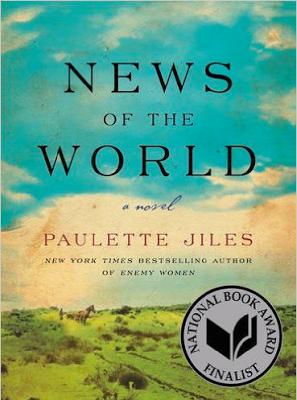
2. Mothering Sunday. Graham Swift wrote this elegant and stunning 192 page novel. Its shortness emphasizes just how masterful it is because in just a few pages Swift creates an entire world and gives us big themes like class, the power of storytelling, and loss, all delivered in prose that is erotic, economical, and powerful.
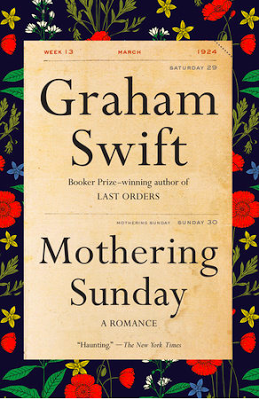
3. Raymie Nightingale. Kate DiCamillo wrote one of my all-time favorite books, Because of Winn Dixie, but this one is almost as good. A look at the definitions of friendship, family (chosen and blood), and the desire to be a good person. I absolutely loved it.
4. Miss Jane. Full disclosure here: the author, Brad Watson, was one of my mentors when I was studying for my MFA. But that doesn't change the fact that this is absolutely one of the best novels of the year. Watson creates one of the most memorable characters I've ever read and looks at the many different kinds of love there are in the world. This novel is a masterpiece and I wish everyone would read it.
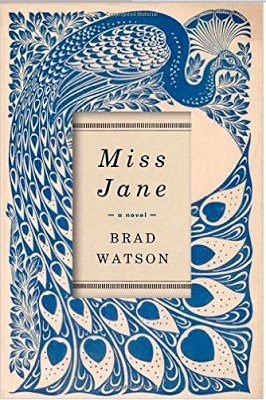
5. The Wonder. Emma Donoghue completely immerses us in a specific place (rural Ireland) and time (the mid-1800s) with two compelling and complex lead characters in this novel about a young girl who refuses to eat and may or may not be a saint. It's a fascinating look at belief, religion, fanaticism, class, and much more in one of the best novels of the year. I was disappointed by the ending, which didn't feel quite right to me, but this was probably the book that was the biggest page-turner of the year for me.
6. The Shepherd's Life-James Rebanks. This nonfiction look at a sheep-farmer's life in Northern England is one of the most beautiful books I've ever read, with stunning sense of place. It's a lament for a dying way of life and for all ways of life that have gone. Highly recommended for anyone who loves to read about nature, land, tradition.
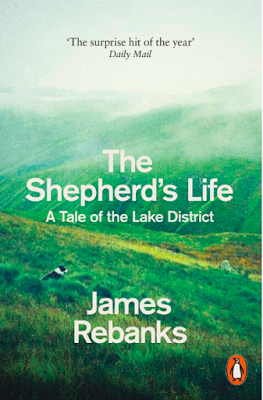
7. Some Writer! Melissa Sweet uses drawings, text, and much more to give us the story of E.B. White, author of Charlotte's Web, Stuart Little, and other books. It's a magical look at one of the all-time best and most fascinating writers.
8. Upstream. This collection of essays by Mary Oliver was the perfect balm for me in the days following the horrifying results of the election. Meditations on nature and the fact that everything that is is holy.
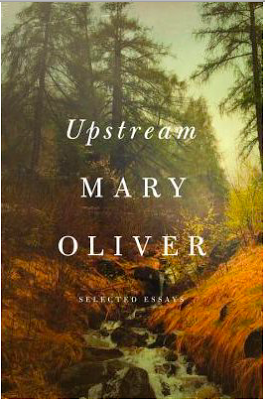
9. My Father the Pornographer. Chris Offutt is at his best in this moving look at the relationships between fathers and sons and the nature of being creative.
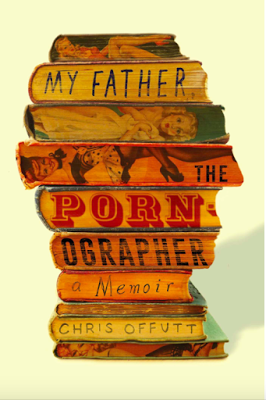
10. Maxgate. This novel by Damien Wilkins came out overseas in 2013 but was only released in America this year. I'm obsessed with Thomas Hardy so naturally I was drawn to this novel about his deathbed days at his beloved manor, Maxgate, from the point of view of one of his servants. It's a mesmerizing book for anyone who loves Hardy and is especially smart by telling the story through the eyes of a working class woman, Hardy's favorite subjects.
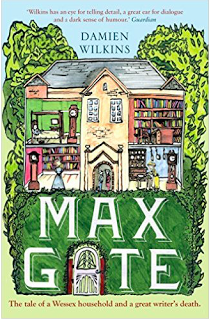
11. My Name Is Lucy Barton. Elizabeth Strout is one of my favorite writers and while this is my least favorite of her books (besides The Burgess Boys, which didn't land right for me) it is still a remarkable novel and I've been haunted by it ever since reading it, especially the scene where the young Lucy is trapped in a truck with a snake. Prose that completely creates a mood.
12. Spill Simmer Falter Wither-Sara Baume. The tale of an old man and his dog on the run in Ireland is another one that has really stuck with me although the ending fell a little flat for me. But the voice is remarkable.
The books listed above were all published in 2016 but I read many other books this year that have been around for awhile (or were published this year but just didn't make my favorites list for one reason or another). Here's a list of all the books I read this year. It's not a massive list as I'm a slow reader who savors every word and this of course doesn't include the dozens of manuscripts and student papers I read this year.
Grace Notes, Lamb, and The Anatomy School, all by Bernard MacLaverty, one of my favorite novelists who also wrote Cal, which I read several years ago. After loving Cal so much I wanted to read as much of his work as I could and this year read three of his novels, with Grace Notes being my favorite of the bunch. MacLaverty is a master at putting the reader completely in the world he's created and populated with some of the most memorable and likable characters I've ever encountered, all living in Ireland and Scotland during the Troubles.
The Light Between Oceans-M.L. Stedman. This novel is a bit more blatantly romantic than books I usually read but the author has said that it was inspired by Thomas Hardy, so I had to read it. The plot is definitely Hardy-worthy, if a bit too melodramatic for my taste. But it's a beautiful book and made an even more beautiful movie starring Alicia Vikander and Michael Fassbender.
Train Dreams-Denis Johnson. One of the best books I've ever read.
On Elizabeth Strout-Colm Toibin
Hide-Matthew Griffin
The War That Saved My Life-Kimberly Brusker Bradley. I absolutely loved this book; further proof that YA fiction is some of the best writing around.
The Return of the Native-Thomas Hardy. I read this while touring Hardy Country during my honeymoon so it holds an extra special place in my heart.
The Loney-Andrew Michael Hurley. This book was a sensation in England and I read it while over there this spring. Nothing like a well-written horror story. And while the plot ultimately fizzled out for me I still think about the mesmerizing prose and the landscape created by the author.
H is for Hawk. Helen MacDonald's look at grief and hawk-rearing is a must-read for any serious lover of literature. A masterpiece.
Nathan Coulter-Wendell Berry
Hillbillyland-J.W. Williamson
Fanny Says-Nikole Brown. A wonderful collection of poetry.
Before the Fall-Noah Hawley created one of my all-time favorite television series, "Fargo", so I had high hopes for this novel. It's an enjoyable page-turner but ultimately became a bit too unbelievable and hokey for me to absolutely love it.
The Call of the Wild-Jack London
A Spool of Blue Thread-Anne Tyler. Definitely in the top three best books I read this year. Tyler's best work, I think. I'll never forget it.
A Monster Calls-Patrick Ness. A beautiful book about grief.
A Room With a View-E.M. Forster's masterful novel about being a traveller instead of being a tourist and the way travel can change us for the better.
The Past-Tessa Hadley-I've just started this and am absolutely loving it so far but am not far enough in to give a good review.
Published on December 29, 2016 08:52
October 28, 2016
New website
Published on October 28, 2016 19:14
March 16, 2016
Walking to Write: An Exercise in Observation and The Abstract
I'm sharing a writing exercise I'm giving to my writing students tomorrow.
I'll be taking the students into the woods along Brushy Fork Creek here in Berea, Kentucky. This is a quiet area (pictured here as it appears in early spring) full of old beech trees and the meandering creek that begs for people to wade in it, offering a music of running water that is instantly calming.

Once there, they will be given the following handout, which includes a prompt directing them to make a list of sensory details which they will use to write about an abstract emotion. I'm sharing this exercise because I want to encourage more people to incorporate walking into their writing lives. It is absolutely the door to all writing for me.
I hope you might print out the handout below and use it for your own writing exercise. And even if you don't, I hope you'll go into the woods, or walk amongst trees, wherever that may be.
Comments or questions are welcome in the comments section below.
Walking to Write | Silas House | ENG 382
I wish to speak a word for Nature, for absolute freedom and wildness, as contrasted with a freedom and culture merely civil--to regard man as an inhabitant, or a part and parcel of Nature, rather than a member of society….I think that I cannot preserve my health and spirits, unless I spend four hours a day at least--and it is commonly more than that--sauntering through the woods and over the hills and fields, absolutely free from all worldly engagements. Henry David Thoreau, “Walking”
Nothing like a nighttime stroll to give you ideas. J.K. Rowling
Writing is one way of making the world our own, and… walking is another. Geoff Nicholson, The Lost Art of Walking
What is it about walking, in particular, that makes it so amenable to thinking and writing? The answer begins with changes to our chemistry. When we go for a walk, the heart pumps faster, circulating more blood and oxygen not just to the muscles but to all the organs—including the brain. Walking on a regular basis also promotes new connections between brain cells, staves off the usual withering of brain tissue that comes with age, increases the volume of the hippocampus (a brain region crucial for memory), and elevates levels of molecules that both stimulate the growth of new neurons and transmit messages between them…Because we don’t have to devote much conscious effort to the act of walking, our attention is free to wander—to overlay the world before us with a parade of images from the mind’s theatre. This is precisely the kind of mental state that studies have linked to innovative ideas and strokes of insight.
Where we walk matters as well. A small but growing collection of studies suggests that spending time in green spaces—gardens, parks, forests—can rejuvenate the mental resources that man-made environments deplete. Ferris Jabr, “Why Writing Helps Us Think,” The New Yorker
This will be an exercise not only in observation and capturing sensory details but also in articulating the abstract emotions that are so important to writing.
· Observe in silence.
· Explore the woods. You don’t have to walk far (unless you want to), but move around for a little while, walking along the creek or on the paths.
· Make a list of sensory details. Look around and list what you see, fear, taste, feel, and smell. Heighten your senses, getting closer to things to get their full sensory effect. Actually touch trees, mosses, water, etc. Take deep breaths to smell properly. And so on…
· Be still for a time, studying things.
· Allow yourself about 15-20 minutes to write, focusing on capturing an abstraction through your observations. I’d like for you to imitate this passage from Their Eyes Were Watching God wherein Zora Neale Hurston does a remarkable job of exploring the abstract. Imitation does not need to be exact but keep in mind the way Hurston is doing this and come up with your own way of imitating her device (or stick closely to the way she’s done it...up to you):
So Janie began to think of Death. Death, that strange being with the huge square toes who lived way in the West. The great one who lived in the straight house like a platform without sides to it, and without a roof. What need has Death for a cover, and what winds can blow against him? He stands in his high house that overlooks the world. Stands watchful and motionless all day with his sword drawn back, waiting for the messenger to bid him come. Been standing there before there was a where or a when or a then. She was liable to find a feather from his wings lying in her yard any day now. She was sad and afraid too. –Zora Neale Hurston, Their Eyes Were Watching God
Here are a few partial sentences that could be possible prompts:
o Death is like the woods on spring day
o God is the trees
o Belief is a creek in March
o Sadness is the color of moss in early spring
o The beech trees are doubt
More Examples of Expanding the Abstract Emotions
She tried to go on with her letter, reminding herself that she was only an elderly woman who had got up too early in the morning and journeyed too far, that the despair creeping over her was merely her despair, her personal weakness, and that even if she got a sunstroke and went mad the rest of the world would go on. But suddenly, at the edge of her mind, Religion appeared, poor little talkative Christianity, and she knew that all its divine words, from 'let there be light', to 'it is finished' only amounted to 'boum'. Then she was terrified over an area larger than usual; the universe, never comprehensible to her intellect, offered no repose to her soul, the mood of the last two months took definite form at last, and she realized that she didn’t want to write to her children, didn’t want to communicate with anyone, not even with God.—E.M. Forster, A Passage to India
(boum is French for “a party,” “a tremendous success,” or “a loud noise”—Forster’s meaning is left up to our own interpretation)
The earth was warm under me…queer little red bugs came out and moved in slow squadrons around me. Their backs were polished vermilion, with black spots. I kept as still as I could. Nothing happened. I did not expect anything to happen. I was something that lay under the sun and felt it, like the pumpkins, and I did not want to be anything more. I was entirely happy. Perhaps we feel like that when we die and become a part of something entire, whether it is sun and air, or goodness and knowledge. At any rate, that is happiness; to be dissolved into something complete and great. –Willa Cather, My Antonia
At the center of his own faith there always stood the convincing mystery--that we were made in God's image. God was the parent, but He was also the policeman, the criminal, the priest, the maniac, and the judge.--Graham Greene, The Power and The Glory
(c) 2016, Silas HouseFind out more at www.silashouse.org
I'll be taking the students into the woods along Brushy Fork Creek here in Berea, Kentucky. This is a quiet area (pictured here as it appears in early spring) full of old beech trees and the meandering creek that begs for people to wade in it, offering a music of running water that is instantly calming.

Once there, they will be given the following handout, which includes a prompt directing them to make a list of sensory details which they will use to write about an abstract emotion. I'm sharing this exercise because I want to encourage more people to incorporate walking into their writing lives. It is absolutely the door to all writing for me.
I hope you might print out the handout below and use it for your own writing exercise. And even if you don't, I hope you'll go into the woods, or walk amongst trees, wherever that may be.
Comments or questions are welcome in the comments section below.
Walking to Write | Silas House | ENG 382
I wish to speak a word for Nature, for absolute freedom and wildness, as contrasted with a freedom and culture merely civil--to regard man as an inhabitant, or a part and parcel of Nature, rather than a member of society….I think that I cannot preserve my health and spirits, unless I spend four hours a day at least--and it is commonly more than that--sauntering through the woods and over the hills and fields, absolutely free from all worldly engagements. Henry David Thoreau, “Walking”
Nothing like a nighttime stroll to give you ideas. J.K. Rowling
Writing is one way of making the world our own, and… walking is another. Geoff Nicholson, The Lost Art of Walking
What is it about walking, in particular, that makes it so amenable to thinking and writing? The answer begins with changes to our chemistry. When we go for a walk, the heart pumps faster, circulating more blood and oxygen not just to the muscles but to all the organs—including the brain. Walking on a regular basis also promotes new connections between brain cells, staves off the usual withering of brain tissue that comes with age, increases the volume of the hippocampus (a brain region crucial for memory), and elevates levels of molecules that both stimulate the growth of new neurons and transmit messages between them…Because we don’t have to devote much conscious effort to the act of walking, our attention is free to wander—to overlay the world before us with a parade of images from the mind’s theatre. This is precisely the kind of mental state that studies have linked to innovative ideas and strokes of insight.
Where we walk matters as well. A small but growing collection of studies suggests that spending time in green spaces—gardens, parks, forests—can rejuvenate the mental resources that man-made environments deplete. Ferris Jabr, “Why Writing Helps Us Think,” The New Yorker
This will be an exercise not only in observation and capturing sensory details but also in articulating the abstract emotions that are so important to writing.
· Observe in silence.
· Explore the woods. You don’t have to walk far (unless you want to), but move around for a little while, walking along the creek or on the paths.
· Make a list of sensory details. Look around and list what you see, fear, taste, feel, and smell. Heighten your senses, getting closer to things to get their full sensory effect. Actually touch trees, mosses, water, etc. Take deep breaths to smell properly. And so on…
· Be still for a time, studying things.
· Allow yourself about 15-20 minutes to write, focusing on capturing an abstraction through your observations. I’d like for you to imitate this passage from Their Eyes Were Watching God wherein Zora Neale Hurston does a remarkable job of exploring the abstract. Imitation does not need to be exact but keep in mind the way Hurston is doing this and come up with your own way of imitating her device (or stick closely to the way she’s done it...up to you):
So Janie began to think of Death. Death, that strange being with the huge square toes who lived way in the West. The great one who lived in the straight house like a platform without sides to it, and without a roof. What need has Death for a cover, and what winds can blow against him? He stands in his high house that overlooks the world. Stands watchful and motionless all day with his sword drawn back, waiting for the messenger to bid him come. Been standing there before there was a where or a when or a then. She was liable to find a feather from his wings lying in her yard any day now. She was sad and afraid too. –Zora Neale Hurston, Their Eyes Were Watching God
Here are a few partial sentences that could be possible prompts:
o Death is like the woods on spring day
o God is the trees
o Belief is a creek in March
o Sadness is the color of moss in early spring
o The beech trees are doubt
More Examples of Expanding the Abstract Emotions
She tried to go on with her letter, reminding herself that she was only an elderly woman who had got up too early in the morning and journeyed too far, that the despair creeping over her was merely her despair, her personal weakness, and that even if she got a sunstroke and went mad the rest of the world would go on. But suddenly, at the edge of her mind, Religion appeared, poor little talkative Christianity, and she knew that all its divine words, from 'let there be light', to 'it is finished' only amounted to 'boum'. Then she was terrified over an area larger than usual; the universe, never comprehensible to her intellect, offered no repose to her soul, the mood of the last two months took definite form at last, and she realized that she didn’t want to write to her children, didn’t want to communicate with anyone, not even with God.—E.M. Forster, A Passage to India
(boum is French for “a party,” “a tremendous success,” or “a loud noise”—Forster’s meaning is left up to our own interpretation)
The earth was warm under me…queer little red bugs came out and moved in slow squadrons around me. Their backs were polished vermilion, with black spots. I kept as still as I could. Nothing happened. I did not expect anything to happen. I was something that lay under the sun and felt it, like the pumpkins, and I did not want to be anything more. I was entirely happy. Perhaps we feel like that when we die and become a part of something entire, whether it is sun and air, or goodness and knowledge. At any rate, that is happiness; to be dissolved into something complete and great. –Willa Cather, My Antonia
At the center of his own faith there always stood the convincing mystery--that we were made in God's image. God was the parent, but He was also the policeman, the criminal, the priest, the maniac, and the judge.--Graham Greene, The Power and The Glory
(c) 2016, Silas HouseFind out more at www.silashouse.org
Published on March 16, 2016 09:53
January 1, 2016
What I Know: A Prayer Essay
This year:
Find a creek, river, lake, or ocean, and be still beside it for a time. Sit by an open fire and watch the flames. Sit on the porch and lie on the grass. Light candles. Take a deep breath. Write a letter to someone.
Discover something new everyday. Learn. Tell stories. Listen to old people. Ask them questions.
Do something nice for others when you can and don't hesitate to be kind to yourself.
Read actual, real books and newspapers.
Spend an entire day without looking at your phone. If you feel the urge to post a selfie everyday, take a picture of some other beautiful thing instead. Remember that there is power in moderation.
Learn to cook or bake something new. Enjoy every meal. Savor your food. Drink water.
Be completely quiet. Turn your favorite song up as loud as it will go.
If someone makes you feel bad all the time, get away from them. Laugh with others. Laugh while you're alone.
Spend time with animals. They make us better people.
Don't judge. Think this: "There but for the grace of God go I" or "Everyone you meet is fighting a hard battle." Forgive others. Forgive yourself.
--Silas House, from "What I Know: a Prayer Essay"
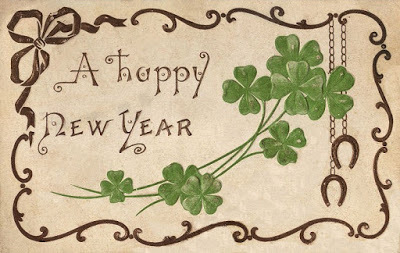
Find a creek, river, lake, or ocean, and be still beside it for a time. Sit by an open fire and watch the flames. Sit on the porch and lie on the grass. Light candles. Take a deep breath. Write a letter to someone.
Discover something new everyday. Learn. Tell stories. Listen to old people. Ask them questions.
Do something nice for others when you can and don't hesitate to be kind to yourself.
Read actual, real books and newspapers.
Spend an entire day without looking at your phone. If you feel the urge to post a selfie everyday, take a picture of some other beautiful thing instead. Remember that there is power in moderation.
Learn to cook or bake something new. Enjoy every meal. Savor your food. Drink water.
Be completely quiet. Turn your favorite song up as loud as it will go.
If someone makes you feel bad all the time, get away from them. Laugh with others. Laugh while you're alone.
Spend time with animals. They make us better people.
Don't judge. Think this: "There but for the grace of God go I" or "Everyone you meet is fighting a hard battle." Forgive others. Forgive yourself.
--Silas House, from "What I Know: a Prayer Essay"

Published on January 01, 2016 08:13




